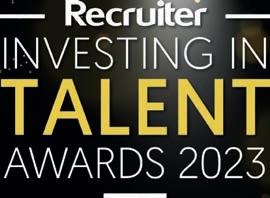



















HOT 100 blazes ahead thanks to tech







































































INCORPORATING Recruitment Matters Business intelligence for recruitment and resourcing professionals Mar/Apr 2024 www.recruiter.co.uk














D






COVER IMAGE | GETTY
WWW.RECRUITER.CO.UK 3 12 E COMMUNITY 32 Social 35 My Brilliant Recruitment Career: Tom White 36 Movers & Shakers 37 Recruiter contacts 38 The Last Word: Dr Cath Sleeman INCORPORATING Recruitment Matters 38 21 16 18 C INTERACTION 18 Viewpoint Heather Salway, Jump Advisory 19 Soundbites
FEATURES
THE BIG STORY: HOT 1OO It has been another strong year for many companies in the recruitment sector, with tech recruiters once again making a big impact within the HOT 1OO. See if your recruitment firm has made it on to the list measuring the highest gross profit per head/ employee. With thanks once more to our expert partners who produced the list, Gambit Corporate Finance. A NEWS 05 Loan Charge scandal takes new twist Controversial s.684 notices have been uncovered, further adding to the tax confusion for people 07 Better Hiring Toolkit for local authorities The new resource helps LAs make informed, safer recruitment decisions 08 Recruiters on the HMRC ‘name and shame’ list Staffline and Randstad are among the recruitment firms named for failing to pay workers the NMW 09 Contracts & Deals
TRENDS 10 Workplace Two recruitment networks drive inclusivity 11 Business Advice Lawyer Frances Lewis on Labour’s plans on employment rights 12 Insight Four steps for inclusive neurodiverse recruitment: research reveals a disparity in employment rates for neurodiverse adults 16 Tech & Tools The latest recruitment technology and services
21
B

NAVIGATING THE LABYRINTH OF COMPLIANCE WITH FCSA
Advertisement Feature
 Leader
Leader
In turbulent times, we need a strong core to keep our business agile and able to withstand body blows from extraneous circumstances, as well as a firm hand on the wheel to maintain our direction. That’s part of the philosophy behind Recruiter’s HOT 100; without a profitability mindset at the core and firm, thoughtful control over spending, a business can simply blow about with ‘all thrust, no vector’, in air force parlance. The 100 recruitment businesses on our HOT 100 list this year have demonstrated grace and control under the wild winds of our mad world and are individual benchmarks of what a superb industry ours is. Well done to the HOT 100 companies!
“In turbulent times, we need a strong core to keep our business agile to withstand body blows”
And we are thrilled with the commitment of our analysts, Simon Marsden and the team at Gambit Corporate Finance, to furthering the quality and authority of our rankings. Thanks to Gambit once more in the second year of our partnership.
Other business achievements by our recruitment constituency sparkled and gleamed at Recruiter’s Investing in Talent Awards event in January. We can be so proud of the industry-wide initiatives to recruit and embrace underrepresented groups among our ranks, not only for our clients.
Spring is in the air!
 DeeDee Doke, Editor
DeeDee Doke, Editor



Loan charge scandal takes a new twist with s.684 notices
BY PATRICK APPLETON
THE LOAN CHARGE SCANDAL has been engulfed by further condemnation, with the uncovering of the highly controversial s.684 notices by Sky News last month [February 2024] as politicians round on the crisis and call for a full investigation on the matter.
WELCOME
WWW.RECRUITER.CO.UK 5 IMAGE | ISTOCK NEWS UPDATE
39,302 FOLLOWERS

According to the Loan Charge Action Group (LCAG), an s.684 is notice of a tax liability transfer, transferring liability for tax from employer to employee in this case, for use of contractor payroll loan schemes.
HMRC has discretion to transfer liability in certain cases, but FOI responses from HMRC to various requests shows it understands the controversy of the problem as the organisation has “discreetly” sent out 3,000 of these notices [correct at time of writing] to individuals.
From 1 November 2022 to 28 January 2024, the HMRC Counter-Avoidance directorate issued around 1,480 letters to exercise the discretion
under s684(7A)(b) ITEPA 2003 in loan-related cases.
Receipt of the notice – which can’t be appealed, only judicially reviewed –means that HMRC will then issue demands for tax it thinks is due, says the LCAG.
The DUP’s Sammy Wilson has called the issues stemming from the recent loan charge debate “bureaucracy out of control”, as he and other MPs called on those affected to demand a public inquiry.
That call was heeded in late January by Labour’s Shadow Chancellor Rachel Reeves, who said on the Iain Dale radio show on LBC that the party would commit to an independent review on
the loan charge if Labour win the next general election.
The LCAG has written to Reeves about the review and asked her to ensure that the s.684s will also fall under this remit.
Wilson, MP for East Antrim – and a proponent of the loan charge debate – said the issue was a “national scandal” that has all the hallmarks of another “Horizon thing [the British Post Office scandal]”.
“Then maybe at some stage in the future, public awareness will be increased because somebody will actually say, here’s another story which needs to have a public airing, and we’ll do something like [Mr Bates vs The Post Office],” he told Recruiter
“It’s the only way you’re going to get any movement and hopefully we’ll finally get a minister who’s got the balls to do their job.”
Critics of the loan charge, which has been linked to 10 suicides so far, have rounded on financial secretary to the Treasury, Nigel Huddleston, imploring him to effect change on a matter that has affected ordinary working people like recruiters, IT consultants and nurses, to name a few.
Liberal Democrat MP for Bath, Wera Hobhouse told Recruiter that Huddleston mentioned for people to get in touch with HMRC but “they are the very body that is at the heart of the problem.”
“[HMRC behaviours] are sort of attitudes and cultures that one has had who has been particularly exposed during the post office scandal, but they seem to sort of be going right through the government itself,” she said. “That’s just not acceptable.”
The SNP’s Chris Stephens, MP for Glasgow South West added that the “blanket implementation has been unjust” and the party has been calling “full independent review” since 2020.
Conservative MP for Haltemprice and Howden David Davis and Plaid Cymru MP for Arfon Hywel Williams were both contacted but each declined to the opportunity to comment.
NEWS UPDATE 6 RECRUITER MAR/APR 2024 IMAGES | ISTOCK / SHUTTERSTOCK
AS OF 22 FEB 2024
Better Hiring Toolkit offers best practice resource for
local authorities
SAFEGUARDING EXPERTS FROM
The Disclosure and Barring Service (DBS) and Better Hiring Institute have joined forces to launch a best practice recruitment resource for the local authority sector.
The Local Authority Better Hiring Toolkit provides an essential guide for local authority employers to make informed, safer recruitment decisions.
The toolkit provides accessible guidance to support employers with both obtaining and providing effective references, supporting information to navigate effective pre-employment vetting, and simplified guidance around legal responsibilities.
In collaboration with Better Hiring Institute, the Local Government Association,
Cifas and Reed Screening, the Better Hiring Toolkit aims to attract skilled and talented professionals to public sector roles, while promoting processes to keep dishonest people out of local authorities.
Local authorities provide support and services to a range of vulnerable people across their region, and the toolkit will support employers recruit effectively, efficiently and focus on delivering the best service possible for the communities that they work with.
Keith Rosser, chair of the Better Hiring Institute & Director of Reed Screening, said: “The toolkit has the potential to be really transformative to local authority recruitment, and the more organisations that benefit, the faster the UK as a whole


moves forward. We want to make UK hiring the fastest and fairest in the world, with a live local, work anywhere philosophy.”
Ian Johnston, executive director of disclosure for the Disclosure and Barring Service, said: “We are delighted to support the development of a simplified and supportive toolkit, free of charge, supporting those in local authority recruitment to make safer, informed decisions that will help to safeguard local vulnerable people.”
Objectives
Among the key ambitions of the Better Hiring Toolkit are: consolidate industry best practice guidance to local authorities and establish best practice where it does not currently exist help embed a culture that applies a 360° approach to safeguarding in employment support local authorities to offer safer, more transparent recruitment


NEWS UPDATE WWW.RECRUITER.CO.UK 7
Recruiters marked out by ‘name and shame’ minimum wage list
BY DEEDEE DOKE
STAFFLINE AND RANDSTAD SOLUTIONS are among the recruitment businesses named last month [February 2024] by HMRC for failing to pay workers the National Minimum Wage (NMW).
A total of 524 businesses across all industry sectors were ‘named and shamed’ in the announcement for failing to pay over 172,000 workers NMW. The businesses have been ordered to repay workers nearly £16m, plus an additional financial penalty, after the breaches left the workers out of pocket.
The action comes as the National Living Wage is set to increase by 9.8% to £11.44 an hour on 1 April, as announced in November’s Autumn statement.
Major high street brands such as Greggs, Easyjet, Currys, and luxury department store Harrods are among the offenders.
HMRC said the businesses named in the list have since paid back what they owe to their staff and have also faced financial penalties of up to 200% of their underpayment, with the
investigations concluded between 2015 and 2023 by HMRC.
When contacted by Recruiter, Staffline, which was said to have underpaid 36,767 workers by £5.1m, responded that the HMRC announcement referenced the period 2013 to 2018.
“Management would like to clarify that remedial actions were taken in 2019 and formally concluded with HMRC to their complete satisfaction,” the Staffline statement said.
Randstad Solutions was reported to have underpaid 5,348 workers by £123,505.
Other recruitment companies on the list included Abacus Employment Services, Angard Staffing Solutions, Team Recruitment (Poole), Major Recruitment, Gi Group, Search Consultancy, Meridian Business Support, Newcross Healthcare Solutions, Neaves and Neat Employment Services (dissolved), Staff 247, Finecare 247.
The government launched a ‘National Minimum Wage Naming Scheme R20 Educational Bulletin’ on 20 February to further guide employers on their responsibilities to pay the minimum wage.
NEWS UPDATE 8 RECRUITER MAR/APR 2024
CONTRACTS & DEALS

Berry Recruitment
Berry Recruitment has partnered with facilities management organisation EMCOR UK to supply workers across East Anglia. Jobs include production operatives, industrial cleaners, cleaning supervisors, scaffolders, welders, forklift divers, as well as other roles.
Bluestones Investment Group
Bluestones Investment Group, a specialist investment group focusing on the recruitment sector, has completed two strategic acquisitions, Australasian Recruitment Company and Home Recruitment. ARC, headquartered in London, specialises in the placement of candidates travelling to the UK from Australia and New Zealand into a variety of white-collar, remote and office support roles. Operating out of Auckland in New Zealand, Home specialises in the placement of Kiwi expats returning from overseas into white-collar and office support roles across the country.


Grace Blue Partnership
Grace Blue Partnership, a global executive search firm specialising in leadership talent, has been acquired by SaaS software company Sinecure.ai. Grace Blue has offices in New York, London and Singapore, with expertise including consumer brands and agencies, as well as sports, media and entertainment.
DEAL OF THE MONTH
Staffing 360 Solutions
Boutique private equity firm IPE Ventures has acquired all businesses within the UK arm of Staffing 360 Solutions.
The NASDAQ-listed Staffing 360 portfolio includes recruitment consultancy CBSbutler and sister companies The JM Longbridge Group, Clement May and Butler Bridge & May. Rob Harper, managing director of CBSbutler, will continue to lead the group, supported by the new

investor team led by Adam Fletcher as chairperson and Mark Keegan as group finance director.
The IPE statement said that Staffing 360 Solutions opted to divest its UK businesses as part of a strategic decision to focus on growth opportunities within the US markets.
The business will be operated by CBSbutler Holdings, with headquarters remaining in Redhill, Surrey.

Morson Group
Global talent solutions specialist Morson Group has acquired technology recruitment business InterQuest Group and its sister company Astraeus Consulting for an undisclosed price. A Morson statement said the move was part of expanding its service offerings and solidifying its presence in the technology and professional services markets across the UK, EU and US. It also announced the completion of a majority investment by Onex Partners (Onex). The move is designed to accelerate Morson’s growth and expand its global footprint. The strategic investment, made in collaboration with Morson Group founder CEO Ged Mason and members of the management team, marks a pivotal moment in Morson’s 55-year history, the company said.

Parity Network
IT recruitment specialist Parity has merged with Pertemps Network Group (PNG) to strengthen its position and help it expand into new markets. Rebranded as Parity Network, the Edinburgh-based business, which has been trading for nearly 50 years, serves both permanent and contract clients across the UK, Ireland and a number of other European countries. It becomes part of PNG, a £1bn specialist recruitment network and a longterm investor in Parity, opening it up to more investment and expansion possibilities.
The City Recruiter
Manchester recruitment firm The City Recruiter has signed a deal with finance company Sensible Group to provide talent as the firm looks to grow its sales department. The recruiter says the partnership underscores its ability to drive success for both organisations.
WWW.RECRUITER.CO.UK 9 NEWS CONTRACTS
More contract news at recruiter.co.uk/news
Two recruitment networks driving inclusivity
BY ROISIN WOOLNOUGH
RECRUITERS ARE ON THE front line when it comes to improving diversity of talent pools. When agencies work together, collaborating on diversity, equity, inclusion and belonging (DEIB), it produces much stronger, deeper results, as evidenced by two entries to Recruiter’s Investing in Talent Awards 2023.
Recognising the need for the recruitment industry to help drive DEIB within its own organisations, Recruiter created a new category of Best Industry Group Inclusion Advocacy Initiative. The aim was to highlight the need to recruit diverse individuals not only for clients but for recruitment businesses themselves.
The top winning entry was Programme One, a network of agencies striving to bring more black talent into the recruitment industry and to help them progress their careers. Also gaining applause from the judges was Campaign, the UK’s first peer-to-peer LGBTQ+ business network for the recruitment industry, which earned ‘highly commended’ recognition.
Programme One was formed by Guy Hayward, CEO of recruiter Goodman Masson, in the wake of George Floyd’s murder in the US in 2020. “There are very few black recruiters,” Hayward explained, “so I called together half a dozen
CEOs of my competitors to create Programme One. Collectively, you become a powerful force – you can’t make change alone.”
Initially, Programme One involved 13 recruitment businesses, but it has since grown to 19, with another on the verge of signing.
Hayward thinks the initiative is at a tipping point, with 50 candidates hired and a strong pool of talent on the database. A variety of fundraising initiatives are planned for the summer, including a charity ball and a football tournament, and Hayward hopes to have 50 agencies signed up by the end of 2024.
“The primary objective this year is the number of agencies joining,” he said.
Derek Mackenzie, CEO at Investigo, set up Campaign 18 months ago to promote LGBTQ+ inclusion in the recruitment sector after he was asked the question “How can an organisation be truly inclusive when there’s only one LGBTQ+ person there?”
Through Campaign, which is again a collaborative effort between agencies, Mackenzie has created a network, providing advice and knowledge to individuals.
“I’ve been aware of the struggles that many LGBTQ have in our sector for years, often feeling invisible or isolated, unaware of their options or lacking support,” says Mackenzie. “There are

“The aim was to highlight the need to recruit diverse individuals not only for clients but for recruitment businesses themselves”
great firms out there who are working to be more inclusive to our community.”
Going forward, Campaign is focusing on allyship to spread its message more broadly. It’s also launching online seminars to reach a wider audience.
Programme One’s outreach work includes working with colleges, schools and sports clubs. It also hosted its first networking event last year, in collaboration with the Black Recruiters Network. Jasmine Alexander, lead career outreach consultant at Programme One, is focused on raising awareness of the scheme: “There are a lot of barriers facing black people getting into the industry, the
main one being that they are not aware that recruitment is an opportunity for them.”
That first networking event with the Black Recruiters Network earned Programme One what Alexander called “overwhelming feedback, in a good way, and we’ll do it annually, maybe even bi-annually”.
Elizabeth Taiwo, recruitment consultant at (We Are) Aspire, got a job in 2022 through Programme One. She says the initiative is invaluable, not least because of the mentoring support she received once placed: “There’s lots of touchpoints, informal chats making sure I’m happy, that progression is good and if I have any concerns.”●
TRENDS WORKPLACE 10 RECRUITER MAR/APR 2024
IMAGE | CARMEN VALINO
WILL LABOUR BAN ZEROHOURS CONTRACTS AND INTRODUCE DAY-ONE EMPLOYMENT RIGHTS?
IN AN INTERVIEW IN FEBRUARY, Shadow Deputy Prime Minister Angela Rayner talked about introducing a bill “within 100 days” of an election to make major changes affecting temporary staffing, gig working and contracting, as part of its “new deal for working people”.
Changes would include day-one employment rights for all workers, a ban on zero-hours contracts and an end to ‘bogus’ self-employment. The report also mentions Labour’s intention to enhance rights and protections for those who are genuinely self-employed.
The detail is not yet clear, but these proposals are nothing new. Following Matthew Taylor’s ‘Good Work’ report in 2017 (the Taylor report), BEIS* published its intention to ‘close the loopholes that allow companies to use bogus “self-employment” status as a route to cheap labour and tax avoidance’. Some recommendations were implemented, but the more difficult question of how to tackle bogus self-employment was not.
Whatever the rights and wrongs of Labour's latest and BEIS's earlier proposals, it will be very difficult for any government to introduce quick and effective legislation to address worker status.
The challenge of eradicating 'bogus selfemployment'
In the UK, employment status relies on complicated case law tests going back decades. These can be difficult to apply to modern working practices involving remote working and/or short-term assignments which evolve rapidly. Any attempt to resolve the problem with a new statutory definition or test of self-employment or employment would lead to loopholes and gaming of the system if too narrow or collateral damage if too wide.
Zero-hours
Zero-hours work takes many forms, including a lot of traditional short-term agency worker staffing arrangements like agency nurses, locum teachers and many industrial/warehouse roles, as well as classic gig workers like delivery, taxi app workers and home tutors.
Are all these business models going to be banned as currently operated? Is it really feasible for all rights to apply from day one for all types of workers, however short term or frequent their work is?
It will be complicated to legislate effectively. Again, there will need to be a lot of consultation and we doubt that effective legislation can be implemented quickly. Labour

Frances Lewis
Consultant for Osborne Clarke
may focus only on ‘exploitative’ zero-hours arrangements and set about defining what is exploitative.
It's possible that the right to request predictable hours –likely to come into force from September 2024 – already achieves most of what the Labour Party is proposing.
Is the solution under our noses?
The Taylor report suggested supporting self-employed workers through ‘work tech’ or benefit platforms to provide access to a range of non-statutory benefits and protections, which could be accrued and retained while working for different clients or via different gig worker platforms.
A similar centralised benefit approach could be developed for zero-hours workers with licensed and properly regulated ‘employer organisations’ acting as employers of record, running their pensions, accruing holiday and benefits arrangements from day one, providing access to training and making financial services available to workers, including access to mortgage advice and vehicle finance. If this could be coupled with a statutory requirement for agencies and/or end-users to engage only with licensed operators then this would ensure that zero-hours workers get whatever employment rights the government thinks they should have and, possibly more importantly, aid collection of tax.
This is similar to what some umbrella companies already do, and we can imagine that some might welcome such a licensing arrangement, especially if it meant the ‘dodgy’ end of that market was thereby driven out of business. ●
WWW.RECRUITER.CO.UK 11 BUSINESS ADVICE
↗ FRANCES LEWIS is consultant for Osborne Clarke
Four steps for inclusive neurodiverse recruitment Research indicates a significant disparity in employment rates for neurodivergent adults
BY ALI SHALFROOSHAN
Unemployment for neurodivergent adults
runs at least as high as 30-40%, which is three times the rate for people with disability and eight times the rate for people without disabilities.
These underemployment statistics underscore that there is a pressing need to prioritise and enhance employment opportunities for neurominorities and has prompted a number of major corporations – such as SAP, Virgin and Microsoft – to implement targeted inclusion initiatives.
What can recruiters do to make their recruitment practice, and those of their clients, fairer?
A need for greater focus
The first step to address the employment disparity is to commit to putting greater focus on neurodiversity, especially during recruitment. Around 15-20% of the population is neurodiverse, impacting almost a fifth of the candidate pool. This is not really a niche issue.
To help ensure organisations tap into this potential talent, they need to re-evaluate how they recruit. This means reviewing their current processes and also ensuring people have the right knowledge and awareness of neurodiversity in the workplace.
The use of assessment and neurodiversity
The reason many organisations use psychometric and pre-employment tests is to enhance objectivity, validity and fairness during recruitment, thereby avoiding over-reliance on manager intuition and gut instinct.
This is typically achieved by measuring job-relevant behaviours and capabilities, which can increase predictiveness of future performance, increase objective decisions and reduce the chance of bias. The use of online testing has been shown to improve fairness outcomes significantly, as they are designed to reduce the very significant biases that other, more traditional and subjective recruitment methods, have.
However, despite the increased fairness these tests can help deliver, there is also a risk. Once a set of decision criteria is set, it can potentially impact some of the inclusion goals they are actually designed to deliver, especially if those decisions are ill-thought-out and uninformed.
With emergent topics such as inclusion and neurodiversity, there is still a lot to learn. However, researching best practice, and reviewing a company’s existing recruitment process, is a good place to start.
But what does best practice look like? The cyclical ‘foundations of fairness’ is

a useful means of helping to plan out potential action.
This approach starts with aligning recruitment to organisational diversity, equity and inclusion (DEI) goals, putting good practice into action, analysing the outcomes, and then acting on the learnings to improve the process.
1Align to DEI goals
Carry out a thorough job analysis.
Understand the job being recruited for, the actual skills required, and the competencies needed.
Ensure neurodiverse stakeholders and employees are included to shape, define and inform the approach you are going to take.
TRENDS WORKPLACE IMAGES ISTOCK
12 RECRUITER MAR/APR 2024

2 Achieve recruitment solutions that have DEI at their heart
Be trained. Ensure recruiters are trained in objective assessor skills and are using objective measures in the recruitment process, learn more about the different neurodivergent conditions and understand how they can impact candidates at all stages of the recruitment process.
Review all communications, job descriptions and supporting materials. Ensure that candidates can easily request any reasonable adjustments to be made to the process.
Ensure the assessment process deployed achieves objectivity and maximises the likelihood of fairness.
3 Analyse to ensure fairness and efficacy
Monitor the impact of the recruitment solutions. Look at, and analyse, the data to ensure the process is not impacting negatively on neurodiverse candidates.
Encourage feedback. Ask candidates about their experiences and be open to how the processes can be improved.
4 Act to enhance quality and improve DEI outcomes
Learn and act. Take any feedback and learning from the process as a
WHAT IS NEURODIVERSITY?
The term neurodiversity recognises the strengths and the natural differences in human neurology. Individuals who classify themselves as neurodivergent include conditions such as autism, ADHD, dyslexia, dyspraxia, dysgraphia and dyscalculia.
The term has been embraced by people across education and work, due to its positive focus and emphasis on these differences being a part of normal human variation, relating to how people think, learn, and process information.
Substantial evidence shows that embracing neurodivergent talent leads to increased innovation, productivity, and improved decision-making within organisations. By making recruitment processes more inclusive, it’s possible to tap into a wide range of talents, perspectives, and problem-solving approaches that may not be present in a neurotypical workforce.
These conditions can also make it difficult to navigate some of the processes around recruitment too. Recruiters should consider differences in sensory processing, communication and managing stress and anxiety, for example, allowing neurodivergent individuals to request reasonable adjustments if it helps to make the recruitment process more accessible and inclusive.
USEFUL BACKGROUND
Neurodivergent: Definitions, Examples, and Support (verywellhealth.com)
Neurodiversity Is a Competitive Advantage (hbr.org)
Neurodiversity | Definition, Movement, & Affirming | Britannica
Embracing and understanding
neurodiversity in assessment
Neurodiversity in the Workplace | Statistics | Update 2024 (mydisabilityjobs.com)
whole, and put any suggested changes into action.
Make informed decisions about the assessment tools you are using and whether they need to be changed.
Taking proactive action may involve reviewing the recruitment process again, altering job descriptions, improving communication and providing more supporting materials. The point is, this is a cyclical process that will improve the DEI of the recruitment process, on an ongoing basis.
It is also important to better understand the needs of neurodiverse candidates, how the specific conditions may impact those individuals and their lived experience. Knowledge is power, and there is now a wealth of information about neurodiversity via social media, YouTube, articles etc, which can help develop a better understanding of the candidates and their expectations.
Overall, to address and support neurodiversity in the workplace, recruiters need to ensure neurodiverse candidates can access work opportunities and that they are supported effectively. By improving processes and ensuring DEI is integrated practically and pragmatically during recruitment, recruiters will be best placed to help organisations and their talent thrive.
Ali Shalfrooshan, head of international R&D, Talogy
●
WWW.RECRUITER.CO.UK 13 TRENDS WORKPLACE





CONGRATULATIONS TO OUR 2023 WINNERS
On Tuesday 30 January, Recruiter’s Investing in Talent Awards took place at The Brewery, London. 10 winners were announced at the fantastic event, recognising recruiters at the forefront of diversity, equity & inclusion.
BEST WORKPLACE ENVIRONMENT
Winner: Investigo

Highly Commended: RedLaw

BEST ESG [ENVIRONMENTAL, SOCIAL, GOVERNANCE] ACHIEVEMENT BY A RECRUITMENT AGENCY
Winner: Morgan Hunt
BEST WORKPLACE FOR WOMEN’S HEALTH ISSUES
Winner: Investigo
Highly Commended: Oscar Recruit













BEST WORKPLACE ALLYSHIP PROGRAMME
Winner: Goodman Masson
BEST RECRUITMENT COMPANY TO WORK FOR (1-19 EMPLOYEES)
Winner: Lightning Travel Recruitment
Highly Commended: RedLaw

BEST RECRUITMENT COMPANY TO WORK FOR (20-49 EMPLOYEES)
Winner: 5Values Consulting
Highly Commended: Bramwith Consulting

BEST RECRUITMENT COMPANY TO WORK FOR (50-99 EMPLOYEES)
Winner: European Recruitment
BEST RECRUITMENT COMPANY TO WORK FOR (100+ EMPLOYEES)
Winner: Robert Walters
Highly Commended: Eames Group
RECRUITMENT & RETENTION STRATEGY FOR UNDERREPRESENTED POPULATIONS
Winner: EY
Highly Commended: Goodman Masson



BEST INDUSTRY GROUP INCLUSION ADVOCACY INITIATIVE
Winners: Programme One - Goodman Masson, Deverell Smith, CM, Spencer Ogden, 11, Signify Technology, Meet, Bruin, Gravitas, PRG, Franklin Fitch, La Fosse and Aspire
Highly Commended: Campaign – Investigo, Bruin, DVF Recruitment, Harvey Nash, Goodman Masson, Pod and Sheffield Haworth





@RecruiterAwards | #investingintalent | #RITAwinner www.investingintalent.co.uk
TECH & TOOLS
IN FOCUS: Extending reality
BY SUE WEEKES
It’s fair to say that extended reality (XR), the overarching term for immersive technologies like virtual, augmented and mixed reality (VR, AR and MR), hasn’t yet found its killer use in recruitment. But could this be about to change with the availability of potentially game-changing hardware this year?
Martyn Makinson is CEO and founder of the recruitment agency FourPointZero, based in Manchester and New York, which specialises in XR talent. Over the past five years, he has seen the adoption of VR, AR and similar technologies being used for collaborative working, onboarding, training and interviewing. Before the pandemic, these technologies were not taken seriously, he says, but the situation shifted during Covid as the technology became the ideal solution to overcome the physical barriers caused by the pandemic.

He noted a significant increase in its usage at this time, especially among major professional services consultancies for onboarding and assessment. “But as the world began to return to normal, interest started to diminish slightly and budgets were redirected,” he says.
Makinson identifies a key challenge in using VR for conducting interviews: “Engaging with an expressionless avatar. Your face says a lot – very often, more than words convey,” he says, adding that this makes many employers reluctant to adopt VR for conducting interviews.
He points out that advancements are being made in VR technology to incorporate facial tracking that can display expressions, yet this development is not widely available or adopted in practice.
Daria Fedko, founder of WeAR Studio, a VR and AR development company, says potentially “no other
tool” can give so many insights on user behaviour and experience, cognitive load and more. But she agrees hardware has had its limitations. “Graphics are a consequence of the hardware’s limitations,” she says. “It can’t be super-realistic all of the time.”
But 2024 could be the year that XR starts to fulfil its potential. In February, Apple launched the Apple Vision Pro spatial computer that aims to seamlessly blend digital content with the physical world and enables spatial experiences controlled by what Apple describes as the most “natural and intuitive inputs possible”: a user’s eyes, hands and voice.
Meanwhile, at the CES consumer electronics show in Las Vegas in January, Sony announced it will launch an immersive spatial content creation system later this year, which includes an XR head-mounted display, While the
16 RECRUITER MAR/APR 2024 TRENDS TECHNOLOGY AND SERVICES
brand has been strongly associated with entertainment and gaming, it says it is also targeting business and industry, and is collaborating with the industrial giant Siemens. Alongside this, it’s also reported Google and Samsung are working on new MR products.
The learning and development world is already making use of the tool. The Tomorrow University of Applied Sciences wasted no time in announcing its Impact MBA x Vision as a native app for the Apple Vision Pro. Students receive the headset as part of the learning programme and can participate in hands-free learning, connect with spatial audio and visuals, as well as make use of shared virtual spaces for interactive studying.
“We want to give our students the opportunity to learn with the latest and best technology, and bringing our online community even closer is hugely important as we grow internationally,” said Dr Thomas Funke, co-founder and co-CEO of Tomorrow University. “The Vision Pro headset allows us to do just that.”
Fedko cites onboarding as one of the prime applications for XR technologies and is currently working on a programme for a pathologist college that helps all employees better understand the work the lab does. For employers and recruiters starting out with XR, she advises starting with a simple minimum viable product (MVP) to validate the idea and collecting feedback. “Set the KPIs [key performance indicators] as for any other tool you use, and make sure you communicate the new XR tool in the right way,” she says. “When it comes to user experience, I recommend taking a real-life scenario and adding things that you wish for in real life, but that are only available in a digital simulation. In XR, you can combine
TECHNOLOGY AND SERVICES
best practices from the physical and digital worlds.”
Recruiters and employers should also explore the use of immersive XR technologies for collaborative working – especially those with international offices – as they can elevate a meeting experience into something far more engaging than standard video conferencing. At this year’s World Economic Forum annual meeting in Davos-Klosters in Switzerland, participants from around the world also engaged throughout the week at the virtual Global Collaboration Village. The Village is a purpose-driven platform powered by next-generation XR technologies such as avatars and spatial audio (sometimes called virtual surround sound).
Its value was succinctly summed up by Paul Daugherty, chief technology and innovation officer at Accenture, which partnered with WEF and Microsoft to create the Village. “The metaverse and the broader continuum of virtual reality technologies can completely transform how people work and collaborate,” he said, adding that the Village is a powerful demonstration of how immersive technology can bring people together to address real-world problems and drive change.
Makinson predicts mixed reality is indeed poised to become a transformative technology and even goes as far as saying that it is “ultimately destined to replace mobile phones”. He adds: “It’s the perfect blend of reality and digital connection that will make our interactions seamless and more immersive.” ●
Correction
The logo used for WaveTrackR in the Jan/ Feb 2024 issue of Recruiter was not the correct one. We apologise for the mistake and have corrected it in the online issue.
IN BRIEF
Embedding labour market data in the talent lifecycle
Talent lifecycle specialist Beamery is embedding labour market data into its platform. It aims to provide clients with a real-time picture of skills within their workforce and talent pipeline in relation to their industry/ sector and wider labour market. The market insights are contextualised by industry and role type and sit alongside data about employees, candidates, alumni and potential applicants in the Beamery platform.
www.beamery.com

Accelerating agencies digital transformation
Recruitment and staffing software specialist Bullhorn has acquired Mployee to help accelerate recruitment agencies’ digital transformation journey. Mployee provides Salesforce-based solutions for recruitment agencies, combining Mployee’s middle-office capabilities with the Bullhorn front-office. The acquisition will help Bullhorn deliver its vision for full, end-to-end enterprise solutions for customers using the Salesforce platform.
www.bullhorn.com
Delivering inclusive onboarding
Access Screening and accessibility champions Recite Me are joining forces to deliver more inclusive candidate onboarding processes. The organisations are incorporating an assistive toolbar within a screening platform. It is being integrated into Access Screening’s software solution to provide a suite of tools that cater for various accessibility needs, allowing content to be consumed in ways that work best for them.
www.theaccessgroup.com
https://reciteme.com
Smarter, data-driven recruiting Textkernel, which develops AIpowered recruitment and HR solutions, is partnering with agency CRM specialist Mercury to increase efficiency by offering sourcing, analytics and automation on one platform. Their aim is to enhance the recruitment experience for candidates and recruiters with smarter, more data-driven solutions. Key features will include enhanced data parsing; comprehensive labour market insights; and advanced skills intelligence.
https://www.textkernel.com/
https://wearemercury.com/
TRENDS
WWW.RECRUITER.CO.UK 17 IMAGE | ISTOCK
Why can’t recruiters recruit for themselves? Retention issues don’t need to be a painful concept
BY HEATHER SALWAY












The turnover rate for the UK as a whole increased recently from 14.6% to 22.5%, causing many an HR team to throw up their hands in despair. But career recruiters can only dream of turnover rates like that. The latest data for the recruitment sector shows a whopping 45% average turnover last year.
So why can’t recruiters recruit people who’ll stay in their organisations? One reason is how we recruit people into our businesses. Most recruitment business leaders learned their skills at their desk, so fail to recognise that when we recruit for our clients the final stage in the process is critical. It’s the part we rarely see, and recruiters rarely use when they’re hiring for themselves.
We want clients to make speedy decisions for two reasons: first, great candidates will have multiple offers, and we know speed affects their decisions. Second, we want the placement in our figures for this month – yet those pesky clients insist on multiple interviews, panels, assessment centres, and psychometric assessments when we “know” our candidate is the best on the market.
Good hiring managers know this part of the process is the most important. Balancing speed and accuracy of hire is vital. This balance, I believe, is one reason why their turnover is, on average, half the rate of ours.




















 HEATHER SALWAY is director at Jump Advisory
HEATHER SALWAY is director at Jump Advisory











A typical recruitment business uses a face-to-face interview as their only method of selection. If the candidate is lucky, they might get two interviews. But how effective is that? A 45% turnover would suggest ‘not very’.
So how can we improve our decisions? Perhaps agree on what we’re looking for – especially with trainees, as many recruiters make hiring decisions without agreeing this. Suggestions I’ve heard about predicting success with previously untrained recruiters are: “They need to be a bit salesy”, “They need to be hungry, ambitious”, “I recognise a bit of myself in them”. To make a face-to-face interview more predictive, we must truly understand what we’re looking for, and which factors predict success as well as how to spot them.
Tips for better hiring decisions:
1. Launch a discussion with those involved making hiring decisions in your organisation and who has relevant insight on what makes someone successful in the firm.
2. Make a list of those successful hires in the past, and what has actively contributed to them failing or leaving.
3. Once you’ve agreed what you’re looking for then work out how you’re going to spot those who have the right skills, behaviours, and competencies.
4. Structure your process so that more than one person makes the decision.
5. Make sure all involved in the hiring decision know the answers to point 3. Train them in how to ask the right questions, and how to identify a predictive answer.
6. Competency and behavioural interviews work well IF you know which of them predict success.
7. Consider adding practical assessment – for trainees it’s making a phone call, scrutinising information from CVs, how they take feedback. You might end up with an assessment centre, and it doesn’t need to be complicated to add value.
8. Psychometrics can add value for some jobs but only if you know what you’re looking for. It’s worth taking independent advice. ●
C 18 RECRUITER MAR/APR 2024 INTERACTION VIEWPOINT
IMAGE | ISTOCK
LETTERS TO THE EDITOR
SIMULATING THE GAME OF RECRUITMENT
Recruiter came across this novel suggestion and wondered what our readers thought of this idea. A different birthday present for the would-be recruiter in your extended family?
How about launching a computer game, where somebody runs a recruitment agency in finding and filling jobs? All the details needed to find jobs for companies and jobseekers are there.
It could involve finding educated people, motivated people, skilled people, people with disability issues, working with foreigners, as well as native people. Working with HR departments and governments, on issues such as employment and skills.
It could help educate people – especially youngsters – about the employment industry. It could also include employing people in your recruitment agency; competing with other staffing agencies; and finding new offices.
There are simulation games on lots of issues from soccer to prison, and from flying planes to running railways. Why not on employment agencies?
Joey Vimsante, North Wales
“What is the bravest step forward your business has made so far in 2024?”

LIZ NEVITT
RECRUITMENT DIRECTOR, DEDICATE RECRUITMENT
“As a business operating in a highly specialised niche sector, we’ve recognised our ability to provide added value where perhaps larger, more generalised agencies simply don’t. This year, we have been investing even more time working with clients and candidates, providing a bespoke recruitment experience, which has led to better feedback and results. We’re being brave in showing our community what we do behind the scenes and have been fortunate to be shortlisted for the MATA (Multi Academy Trust Association) National MAT Awards in March 2024 as Education Consultant of the Year.”




ALEX HOE
RECRUITMENT OPERATIONS MANAGER, FORD AND STANLEY
“Against a backdrop of recruitment firms reportedly cutting up to 20% of their staff during Q4 2023, following three new significant client contract awards, this year we have made the call to increase our headcount and back ourselves once again. May 2024 marks our 35th anniversary since the company first embarked upon our mission to help create One Million Better Workdays, meaning over the past three and a half decades we have navigated our way through a lot of market fluctuations.”

NAOMI HOWELLS
MANAGING DIRECTOR, CLASS PEOPLE
“In education, there is a staffing crisis leading to a shortage of applicants, with many competitors cutting costs and scaling back their own workforces to compensate the resulting loss of turnover. Instead, we have deliberately approved the opposite strategy: holding steadfast and recruiting more people to better serve our clients. This approach goes against common advice, but is supporting us to prioritise innovation, identify new talent pools with transferable skills and offer our clients more than others in the sector. It’s a brave choice, but one we’re confident will continue our legacy.”
INTERACTION SOUNDBITES WWW.RECRUITER.CO.UK 19






Enterprise Software for Recruitment Firms, Built on Salesforce














For when you need a true enterprise CRM software for your growing recruitment and staffing agency

Built on Salesforce, TargetRecruit is a full ATS/CRM suite, packed full of innovation. It’s a business critical tool which is easy to configure and customise to your exact business needs, keeping you ahead of the competition.



Empower your recruitment firm with the ultimate CRM


targetrecruit.co.uk








































TECH-ING OVER THE RECRUITMENT INDUSTRY








By Simon Marsden

It was another strong year for many in the UK recruitment sector.


Technology continues to grow the HOT 100, but an impressive year was had by all entrants


Despite ongoing global macroeconomic and geopolitical uncertainty, the sector’s resilience and buoyancy was once again evidenced. Acute skills shortages, candidate scarcity and changing working styles continued to drive growth across the sector amid the backdrop of a flight to technological innovation and increased market fragmentation, which appears likely to continue throughout 2024 and beyond.
This edition of the Recruiter HOT 100 shines a spotlight on recruiters that have successfully navigated the highly dynamic market in 2023,

WWW.RECRUITER.CO.UK 21 IMAGE | GETTY RECRUITER HOT 100 COMPANIES 2023


exhibiting sustained growth and prosperity despite a slowdown across the wider economy. This year’s list includes 72 new entries, many of which are upcoming recruiters that have outpaced their larger, more seasoned peers, which will continue to make a significant impact to the sub-sectors within which they operate throughout 2024. The sector’s resilience and heightened demand was evidenced by the significant year-on-year revenue growth for the companies listed of 20.7% to £6.2bn, which augurs well for the medium-term prospect for the sector.
The technology sector’s dominance in this year’s list has been a recurring theme for several years, reinforcing the sector’s growth and resilience amid the

backdrop of increasing digitisation and the importance of robust IT infrastructures and technical innovation in the post-pandemic environment. Technology sector recruiters have experienced significant enhancement in placement fees in recent periods, boosted by the impact of acute skills shortages in the sector driving blue-chip technology companies to pay premium fees for available talent. Prominent sectors this year include education, IT, and health and social care, all of which are traditionally resilient to wider market cyclicality. Institutional investment within the sector remains targeted on companies with clear sub-sector specialisms, particularly within high growth, defensive markets, demonstrated by the 14 private equity-backed companies placed in this year’s list. PE-backed companies achieved an average gross profit (GP) per employee of £134,083, 4.5% higher than the £128,320 generated by their non-PE-backed counterparts. As PE activity becomes increasingly more

prominent within the recruitment sector, the tangible impacts of PE are increasingly evident and can be attributed to four key factors:
● Increased levels of funding to be deployed into acquisitions, geographic expansion and technological advancements.

● A heightened focus on operational efficiencies and key performance indicators (KPIs).
● Access to a plethora of expertise and strategic advice.
● Potential synergies that can be gained from partnerships with a PE investor’s other investments.

Despite the challenges faced across more cyclical sectors in recent periods, the presence of built environment sector recruiters in the list has doubled in 2023, up from nine to 18 in 2022. This highlights a gradual softening in macroeconomic uncertainty that has persisted since the pandemic, a trend that is likely to continue as inflation falls and debt markets begin to ‘open up’, with a reduction in the cost of capital encouraging further investment and employment. The growth and efficiency gains are increasingly evident across the






22 RECRUITER MAR/APR 2024

Gambit Corporate Finance
Established in 1992, Gambit (www.gambitcf.com) is an independent corporate finance advisory firm specialising in advising private and public companies on mid-market transactions in the UK and overseas. With offices in London and Cardiff, Gambit is widely recognised as a market leader in M&A advice in the human capital sector, having built up detailed industry knowledge and an enviable track record in deal origination and execution.


Gambit’s dedicated human capital team has deep relationships with investors, vendors and acquirers in the sector and has significant M&A market experience across acquisitions, disposals, management buy-outs, fundraisings and restructurings.
Gambit operates both in the UK and internationally as part of Corporate Finance International (www.thecfigroup.com), a global partnership of leading independent investment banks and corporate finance practices in 18 countries, which is ranked 17th in Europe for transactions under €200m (£171m).
Gambit’s recent human capital M&A experience includes the sale of Astutis Ltd to Wilmington Plc and the acquisition of BMSL Group by Indigo Group.
● Heightened agility of smaller companies, enabling them to swiftly adapt to emerging market trends and legislative changes.
● A more scrupulous focus on internal KPIs and fee earner efficiency, helped by smaller, more focused teams.
sector as the average GP per employee increased year-on-year by 1.9% to £129,127, despite significant growth in the total number of employees across all companies in the list from 9,735 in 2022 to 11,713 in 2023. Growth in the average number of employees reflects confidence in the future of the UK recruitment sector, as recruiters continue to invest in talented fee earners to navigate the market through one of its most dynamic and challenging periods.



● Increased levels of innovation and technology driven strategies often underutilised by large recruiters.
● Increased focus on specific geographic regions and attention on specific sub-sector specialisms as opposed to larger peers’ more generalist approach.
Size and Productivity
A continuing trend evident in this year’s list is the outperformance of mid-market recruiters relative to their larger peers, with the top 10 having revenues 39% lower than the average of all companies listed in the HOT 100. The success of mid-market recruiters at creating a more efficient, profitable business with lower revenues than larger players is being driven by four key factors:


This disparity is also evident in employee numbers. Companies that ranked in the top 10 for GP per employee had, on average, the lowest number of employees, with an average of only 52, significantly lower than the average of 117 across the HOT 100. In contrast, firms in the 91-100 bracket had the highest average number of employees, at 186.
Notable mentions
● People Source Consulting has once again demonstrated




WWW.RECRUITER.CO.UK 23 IMAGE GETTY RECRUITER HOT 100 COMPANIES 2023











































ENTRY DEADLINE 27 MARCH 2024 ENTER NOW recruiterawards.co.uk Enter these prestigious awards, and be in with the chance of becoming one of the industry’s elite 2024 020 7324 2784 | @RecruiterAwards Sponsors: Headline sponsor:
exceptional performance by securing the number one position in the list for a third consecutive year, despite a 13.4% decline in revenues relative to the previous year.
● SR2 Rec has outpaced competitors with the highest percentage increase in both revenue and GP, due to its small, highly competent team, involvement in overseas recruitment and its specialism within the technology sector.
● Europa Search has led the way in team expansion, delivering the highest annual growth in employee numbers of 266.7%, earning the company a place on the list despite this being the first year that the company has been eligible to enter.
Key findings
● The success of the recruiters featured in this year’s list is illustrated by the total revenue of the HOT 100 recruiters reaching £6.2bn, a 20.7% increase from the previous year, highlighting the sector’s adaptability and resilience amid economic volatility.
● Technology continued to be the most prominent sub-sector specialism in the list, with 38 technology recruiters featuring, highlighting the sector’s growth and the increased digitisation of the global marketplace.
● Despite the sector’s significant growth in 2023, the minimum GP per employee required to feature in the list has fallen by 63.4% to £42,130, highlighting the continued competitiveness of the sector and the pressure on margins.
● The list exhibits a larger proportion of temporary recruiters, with a 55.3% to 44.7% split in favour of temporary over permanent placements across all companies. However, recruiters servicing the permanent recruitment market were more prevalent among the top-ranked companies.
2023 key trends & outlook for 2024
A continuing trend in this year’s HOT 100 list is the superior performance of recruiters servicing high-growth, candidate-short sub-sectors, including technology, finance and IT. Technology continues to be the most prevalent recruitment sub-sector, with 38 of the HOT 100 companies operating in the sector. With increasing digitisation, the importance of robust IT infrastructures and the rapid advancement of technological innovations, we expect the sector to feature prominently in future years.
The outlook for the recruitment sector in 2024 is shaping up to be one of optimism, underpinned by a focus on agility and talent acquisition. Recent sustained reductions in inflation combined with an expected gradual reduction in interest rates from mid-2024 onwards will create stability, increase confidence and drive investment and hiring in the sector.
A continued adoption of flexible working is set to further evolve recruitment practices, widening talent pools and requiring changes in candidate engagement and company culture. A note of caution around a potential change in government in Q4 2024 and subsequent changes to tax and employment policies means recruiters must remain vigilant and prepared to adapt to the ever-changing market in the UK and beyond.
We would like to congratulate all those that made this year’s Recruiter HOT 100 and we look forward to receiving another batch of high-quality entries for the 2024 list later this year.
WWW.RECRUITER.CO.UK 25 RECRUITER HOT 100 COMPANIES 2023
Technology Facilities management Industrials Driving Energy Architecture Marine Automotive Public sector Legal Real Estate Telecoms Rail Engineeering HR Life sciences Built environment Health & social care IT Executive search Manufacturing Education Finance Sales & marketing Defense Retail Aviation Warehousing HOT 100 COMPANIES BY SUB-SECTOR AVERAGE REVENUES BY RANKING BAND 40 35 30 25 20 15 10 5 0 £100,000,000 £90,000,000 £80,000,000 £70,000,000 £60,000,000 £50,000,000 £40,000,000 £30,000,000 £20,000,000 £10,000,000 0 1-1011-2021-3031-4041-5051-6061-7071-8081-9091-100





1
17
1
1
2
























Financial services (37%), technology (377%)%), commodities (8%) professional services (7%), other (11%)















Rank C han ge Gross p rofit p er head/em p loye e latest y ear ( £ ) Gros s pr ofit per head/em p loye e prev ious yea r ( £ ) Comp any / tradin g nam e Parent group ( where d ifferent name ) Gross p rofit G ros s p rofit prev e ious yea r (£m) S ector cover a ge 1 - £310 994 £353 985 People Source Resourcing Manpower Holdings £12 128 753 £14 867 7 7,3377 7 IT/technology 2 - £282,331 £335,523 2 SSQ S £24,562,805 £27,848, 8 8,3373 Legal 3 N £282 194 £141 238 Cornhill Bond £16 367 237 £7 768 092 9 Legal 4 ▲ £260,586 £218,549 549 CD Recruitment Meddpicc £9 902 255 £ 2 675,828 28 2 IT software 5 N £251 £2 240 £239 182 Durlston Partntners London £6 532 238 £5 979 544 Quantitative finance & data science (40%), technology & digital assets (60%) 6 N £242 2 477 ,477 £220,959 Next N Ventures £24,247,691 £18,781,549 Te Techno ogy 7 N £204,556 £191,605 Meraki Talenent t ResourcingC ng Capital Ventures £6,954,908 £4,981,718 Fina Fin ncia services (51%) accounting (21%), IT & change (15%) professional services (13%) ) 8 ▲ £202,107 £168,607 The he Bridridge( ge ( g ITR IT Recruitment) Morson Group £5,659,000 £4,721,000 IT/t T/ echchnology, pharmaceutical, financial services, legal, professional services
▲ £187,751 £136,296 Trilogy International £9,763,050 £5,860,747 Bus Busi Bu u us ness ss cha c nge & transformation, technology 10 ▲ £185,38 £153 229 The Barton Partnershrship £10,752,110 £8 887,275 Commmerce e & nd ndustry (48%), professional services (28%), private equity (24%) 11 ▲ £175,932 £160,338 Red Global £46 446,000 £36,076,000 Life fe sci sc ence cees, t s echn chnhnolog o y
2 N £173 238 £88 093 The Portfolio Group £7,102,751 £4,052 278 Finance, n HR 13 N £169 271 £97 965 Daksta Galago £3 385 420 £ ,469 470 Life science (48%) tec tech echchnoloogy ( g 52%) 14 N £167,589 £118,950 The Select Recruitment Group £3,854,540 £2,378,994 Technoloogy (32%), offshore e e enenergy (68%)
5 N £165,556 £166,129 Kernel Globa £42, £42 051,323 £31,232,250 Finance,
9
1
1
legal
6 N £165,333 £138,967 Proactive Global nGAGE Specialist Recruitment £4,960,000 £4,169,000 Autoomatioon (48%), manufacturing
robotics
(43% (43 (4 4 ),
s (9%)
▲ £165 005 £174 414 The SR Group £66 991 892 £54 417 259
9 HR( HR (40%), legal (41%), m ), arketing & sales es (7%) finance (13%)
£157,935
Twenty A Holdings £8 967,164 £7,107,075
8 ▲ £163 039
TwentyAI
9 ▲ £162 £1 ,436 £159,659
£8,609,091 £5,268,734
Saragossa
Technology gy
£141,123
£8,274,457 £5,786,053
▲ £162 £ ,167 £138,901 LHI Group £55,623,141 £37,364, 3 382 Technology
renewables
life
ences
built environment
2 N £161,620 £156,846 Goodman Masson £30,384,470 4 £24,311 179 Industry
▼ £160,877 £233,898 Plexus RS £4,665,422 £5,613,542 Techno ogy 24 ▲ £159,000 £124,659 Cornwallis Elt Morson Group £6,996,06,000 £5,485,000 IT, change management & digital skills i innto nto t the financial services, digital, media, legal and professional servi r ces 25 ▲ £158 462 £129,218 Keystream £6,338,4476 £4 522,629 00 Technology, healthcare, life sciences, p publi ub u c sector, chhangange & transformation 26 6 ▲ £157,898 £131 772 La Fosse £42, 2 47 474,598 £29,385 220 IT professionals 27 ▼ £151,777 £156,946 Resourcing Group nGAGE Specialist Recruitment £18,365 000 00 £17 42 ,000 Construction (40%) maintenance & FM M (35%%), techechnica n (25% 2 8 N £150,097 £123,734 Morgan Law £4,9953,190 £4,206,945 Executive (18%), HR (31%), IT (10%) finance an e (29%) procurement n (12%2%) 29 N £148,802 £148,464 Eames Consulting £20,981,067 7 £16,479,513 Insurance (32%), finance (12%) governan rna r ce ce ( (10%10%) technology (35%) chanange & ge transformatmation ion (11%)
0 N £146 739 £95,976 Seven Resourcing S eptinuary Holdco £17 168,68,471 47 £8,349,950 Social care, legal, healthcare, educatiioon 31 N £146,320 £20 761 TML Partners £2,926,403 £3,0 £ 26,422 Executive marketing communicationns s 32 N £144 044 £138,675 G2V Group G2V Recruitment Holdings £62,371 268 £46,733,347 Technology (36%), engineering 34%)), Go , vernment (21%), life sciences (9%) 33 ▲ £142,781 £47 153 SR2 Rec £7,995 751 £1,8886,121 Techno ogy 3 4 N £142 158 £147,739 Cobalt Recruitment £22 460,941 £21,569,947 Real estate (50%), built environment (50%) 35 3 ▲ £139,936 £143 147 Technical Resources £6,437,058 £4 580,714 Consonstruction telecoecoms 36 6 N £139,259 £98,750 Source Group International £12,672,576 £8,492,473 Finance nce (40%), consultancy (13%) retail (10%) digital (9%) 9%) %) liife s fe cien cie ce (6%) telecoms (6%) automotive (3%) commmomodi mod m tie ties (2%) 3 7 ▲ £137,220 £131,640 Oliver James £98,935 606 £68,716,113 Technology & change management 38%) accountancy, audit, actuary& y & fina fin nce (50%), ) egal (5%), risk, insurance, comp mpplian lia l ce ( ce 7%) 38 N £134,416 £97,719 Daniel Owen £11,694,159 £ 0,553 635 Construction 39 N £133 750 £119 357 Sellick Partnership Sellick Partnership Group £13 375 038 £10 622 735 Legal (62%) finance (25%) housing (5%) actuarial (8%) 40 N £132,565 £107,307 SystemsAccountants SystemsAccountants Group £12,593,647 £8,155,350 Financial (80%), managemgement consultants n (10% ( ), IT (10%) 41 N £131 193 £132 531 Venturi £9 577 092 £6 626 564 IT 4 2 ▲ £130 297 £129 608 Axon Moore Axon Moore Holdings £5,472,465 £4,0017,854 5 Finance & accountancy 4 3 N £126 584 £49 552 Career Legal £5 696 285 £ 734 327 Legal (61%), IT change & transformation (39% – within legal, insuranrance, fi finance & managed services) 44 N £125,557 £117,566 Deploy Recruitment Group £3 013 366 6 £3,174,270 Railway w (90% ( ) engineering and built environment (10%) 45 ▲ £124,815 £147,183 NRL Recruitment NRL Group £10,110,000 £ 0,450,000 Oil & gas (35%), nuclear (29%), infra (11%), adv facilities (9%), built envinviron. (8% (8 ), renewable (3%), defence (2%), non-core (2%), conv. power (1%) 46 N £124,083 £134,339 Eden Brown Synergy nGAGE Specialist Recruitment £1 £10,423,23,000 0 £7,926,000 Social care (66%), corporate services and executive (27% , Further Education (7%) 47 N £123,955 £83,156 Ewi Recruitment nGAGE Specialist Recruitment £5,454,000 £3,742,000 Infrastructure engineering (45%), renewable enerrgy (55%) 55% 48 ▲ £123 1 ,672 £128,690 i-Pharm Consulting £16,201 000 £11 196,000 Medical recruitment
9 N £123 282 £47,934 Signify Technology £5,301,142 £2 684,299 Technoloology 50 N £123,056 £124,642 Orion Electrotech Brashfield nvestments £8,983,063 £9,098,902 Manufacturing & engineering (53%), technical (17%), construction (23%), utilities (gas)( 7%) IMAGE | GETTY 26 RECRUITER MAR/APR 2024 Key: ▲ Up ▼ Down – Unchanged N New
0 ▲ £162,244
Barclay Simpson
Cyber security (40%) 40% , audit/risk ris /compliaance nce (60%) 21
(48%),
(27%),
e scci c
(20%),
(5%) 2
& c &commerce, finance profession onnaal services, public sector 23
3
4










80

















Key: ▲ Up ▼ Down – Unchanged N New WWW.RECRUITER.CO.UK 27 RECRUITER HOT 100 COMPANIES 2023 Rank C han g e G ros s pr ofit per h ead /em p loye e late st y ear £ Gros Gr spr s pr ofit per pe p h ead / em p loye e e prev ious yea r (£ ) Comp any/ ny/ tra ding n a m e P are nt g roup (whe re d iffe rent name e G ross pr ofi t G ros s p rofit p rev ious year ( £m S ect or c er over ge age a 51 N £121,056 £85, £8 £ 6 649 Optimus Search £5, £5,326,469 £3,254,644 Life sciences 52 N £119,273 £ £121,415 415 Caritas Recruitment nt nGAGE Specialist Recruitment £5,248,000 0 £4,978,000 Public ic sector 53 N £117 525 £102 £1 £ ,6 ,688 Your World Recruecrruitme tm m mennt Group £29,616,342 £22,796,640 Healthcare 54 N £116,118 £1142 2 280 ,280 But er Rose nGAGE Specialist Recruitment £3,948,000 £3,557,000 Acco A untancy & financance (93%) procurement (7%) 55 N £113,634 34 £58, £558 852 Oakleaf eaf Partrtners er hip £7,954,411 £3 943,109 HR 56 6 N £ £113,506 £1633,134 Amb tionns Pe s rsonnel Ambitions Personnel £4,426,731 £5,0 £5 57,1155 Industrial (80%), commercial (20%) 5 57 N £113,466 £119,584 Baltimorre Co e C nsulting Baltimore Holdings £3,177,042 £2,750,437 Social care re (52%), educducation (4848%) 58 ▲ £111,878 £126,7,767 7 GCS nGage Specialist Recruitment £5,482,000 £5,4451,000 0 Technology (software – 35%, cloud & infrastructure – 24%, data – 15%, cyber – 10%, change & transfor s mati t on 16%) 59 ▼ £110,310 £92,33114 Finataal R Recruitment £6,728,887 £3,969,488 Private equity/P t E portfolio companies 60 ▲ £109,891 £124,6657 6 ConS nSSol Partners Empresaria Group £4,065,971 £4,986,291 IT, technology, finance, 61 N £109,710 £6955,793 Carrring n ngton West £9,873,893 £50,097,122 Built enviro v nment 62 N £109,289 £8585,553 Xce e ede e Group £26,885,000 £23,527,000 IT, technology (73%) renewable energy (27%) 63 N £107,783 £ £10100,227 27 7 First t Ca C ll Contract Services ces £11,209,393 £9,822,255 5 Warehousing, driving, manufacturing 64 N £107,114 £129 9 4 ,4221 Preccisio is s n Resource Group £24,850,380 £15,918,787 Tech & engineering (52%), education, health & social care (9%), public sector & housing (29%), nsururance an e//fintech (10%) 65 N £106,406 6 £ £87,918 8 Cook k Rec Re R ruitment Group £14 684 000 £9 671 000 Healthcare r
N £106 6 2 ,200 2000 £79,9,116 Franklilin in Fit F ch £7,646,385 £5,379,889 IT infrastructure 6 7 N £ £104 104 04 0 4 ,462 462 £11 £111,752 Energize e Gro Gr G up Energize Group Holdings £7,730,152 £5,922,880 Digital, SAP S , technology and cloud 68 N £ £10103,724 £99 557 Senovo £2,489 368 £1,991,141 Technology
9 N £101,730 730 £129,991 Quotacom £2,644,968 £2,079,849 IT, tech tec nology y 7 70 0 N £100,865 £97,451 Morgan Hunt Morgan Hunt Group £12,709,000 £11,889,000 Further Education (23%), social care & housing (22%), property (12%)
N £100,809 £96,936 Skilled Careers £8,568,7 68 77 £6,300,809 Consnstructiotion (40%), engineering (10%) property services (50%) 72 N £100,368 £97,235 Optime £3,312,1 12, 29 £972,347 Aviation (97%), warehousing (3%) 73 N £99,800 £75,241 Premier Group £10,878,204 £7 £7,223,127 Technology and engineeri ee ng 74 N £98,474 £103,883 Quanta QCS Group Holdinings £9,3 £9355,055063 £7,583,4 3 77 Life Sciences (73%), renewables (14%), technology (13%)
N £98,048 £98,503 Vital Morson Grorououp £22,257 000 £19, 9 405,000 00 Rail energy management, t construction, infrastructure, building services 76 N £97,537 £79,936 Fawkes and Reece £12,387,259 £9,9 £ 92,025 Consnstruction tio white collar & blue collar 77 N £97,209 £97 030 European Recruitment £6,513,012 £4 463,33,379 Semiconductor (30%), automot m ive ve (20%), e )embedded ded sys (1 (10%), A (10%), life science (10%), finTech (5% (5%)w ), web eb tech (5%) ot othher (10%) 78 N £95,176 £114,334 Skillfinder International £2,855,275 £2,972,683 Technoloology (50%) financial ial se services (50%) 79 ▲ £94 £94,744 £124,677 IDPP £2,463,331 £2,618,227 Technology
66
69
71
75
▲ £94,671 £120,391 Allegis i Group £51,406,354 £54,657,462 Finance, l fe sciences, engi g neeringing, co constructioiont n, techno ogy, egal 8 1 N £91,585 £105,617 Amoria Bond £ £25,002,625 £18,482,922 Engineeneering (25%), renewables & energy (17%) technology gy (48%), %) pharma/life sciences (10%)
▲ £90,613 £121,184 Networking Peop e £3,986,957 £4,362,62,621 Technology, executive search 8 3 N £85,371 £88,653 Gravitas Group £23,050,284 £18,528,566 Public sector (10.4%), insurance (28.5%) technology (57%) consultaancy (0.5%), bank b ing (3.6%) 8 4 N £85 285 £67 583 Leap29 £45 £4,520,1 2 19 £3 041 215 Energy (71%), ICT (6%), finance (23%)
5 N £85,282 £79,714 Bluestone Group £20 041,387 £14,747,115 Education, healthcare, supply chain, logistics, retail, merchandising industrial, p professional, technical & engineering 86 N £83,413 £105,018 Tria Recruitment £3,586,739 £2,520,429 IT, Technology, architecture & design 87 N £80,415 £76 339 Thorn Baker TBH Reccruitment £6 835,293 £5,191,037 Construction (51%) industrial (42%) facilities & maintenance (7%) 88 N £78,640 £71,439 Oakwell Hampton £1,572,794 £1,643,092 Technology 89 N £78 245 £81,237 Meridian Business Support MO MOC Recruitment £14,788 268 £17,141,070 Industrial and on site (64.91%), RPO (11.87%), office and professional (4.222%), built t environment (12.86%), health (6.14%) 9 90 N £72 488 £42 924 Menlo Park Recruitment £1 739 708 £1 073 110 GP division (75%), nursing and allied heaalth division (15%) US healthTech division (10%) 91 N £70,318 £137,037 Europa Search £1 547,000 £822,222 Data analytics (40%), IT architecture (10%) softwarare development (40%) infrastructure and cloud (10%) 92 N £70 275 £75,279 Anderselite Morson Group £5,622,000 £5,119 000 Construction civil infrastructure, rail, FM, housebuilding, social housing, PRS schemes 93 N £68 889 £109 889 Orbis £8,197,820 £5,604,364 Technology 94 9 N £68, £68 667 66 £63,976 97 Jackson Hogg £6,797,989 £2,750950,954 Science, technology, engineering, manufacturing 95 N £64, £ 501 £54,748 HeadsRe s Resourcing Heads Group Holdings £1,354,514 £875,973 Financial seervices (333.60%) consumer (19.30%), public sector (16.10%) industrial (15.80%) 96 N £64,260 £58,146 46 Careermakers Reccruit r tment £2,570,396 £2,209,550 Industrial (65%), construction (20%), driving (15%) 9 7 N £60,296 £74,333 Ho t Dococtors to nGAGE Specialist Recruitment £6,934,000 0 £5,798,000 Medical ca 98 N £60 002 £51 643 MRL Microscape Recruitment Group £2 340 073 £1 600 932 Semiconductors (81%), life sciences (9%) 9%) te telecoms (4%) software & infrastructure (3%) automotmotive ive (3%) (3% 99 N £45,589 £40 436 Morson Talent Mors Mo on Group £57,442,000 £48,240,000 00 Engineer ne ing, ng n aererospace, ce, defence, marine, IT & digital, rail, infrastructure & construction, energy, professional services 10 0 00 0 N £42,130 £70,309 Consult Energy £2,5 £ 69,919 £2,179,578 Eng neereering in (26%), corporate affairs (15%), data (18%), IT (15%) op , operations (25%)
82
8
● Some 14 companies are PE-backed, generating an average GP per employee of £134,083, compared to £128,320 for non-backed firms, illustrating the benefits of PE investment instilling a rigorous focus on growth in productivity and improving key performance indicators.
● The analysis indicates an inverse relationship between company size and productivity. Companies in the top 10, with an average employee count of 52, demonstrated higher efficiency compared to those in the 90-100 bracket with an average of 186 employees. This highlights that smaller recruiters are successfully leveraging their ability to adapt to wider market and legislative trends, achieving enhanced operational efficiencies. ●
Methodology
The data for this year’s HOT 100 list, showcasing companies with the highest GP per employee, underwent thorough analysis and validation based on the following criteria:
Qualifying criteria – To qualify, companies are required to generate a minimum GP of £1.5m and have at least 20 employees.
Accounts – Latest available accounts for 2022 or 2023 have been used. Accounts must be externally prepared or audited in order to be eligible.
Groups and subsidiaries – For companies which are part of a group, either the consolidated group entity or its subsidiaries can be considered, but not both.
Jurisdiction (Geography) –Eligibility for entry was restricted to companies that are UK-controlled or derived entities. Companies that place talent worldwide which is controlled/delivered from the UK are also eligible.
HOT 100 COMPANIES BY GROSS MARGIN BAND (in
accounting year)
2016/2017
2017/2018
2018/2019
2019/2020
2020/2021
2021/2022
2022/2023
Margin trends
Despite the overall positive performance of the sector in 2023 against a challenging macroeconomic backdrop, the number of companies achieving gross margins
greater than 40% has declined by 52.5% relative to 2022. However, the success of this year’s companies is evident as the number of companies in the lowest
GP band (<10%) fell to the lowest in recent history. The average GP margin across the HOT 100 of 34.1% was slightly down on the 36.9% achieved in 2022.
28 RECRUITER MAR/APR 2024
Source: Company accounts 35 30 25 20 15 10 5 0 Gross market band range less than 10%10% to 15%15% to 20%20% to 30%30% to 40%40% to 50%more than 50%
Recruitment
Ma ers
Issue 108
THE VIEW AND THE INTELLIGENCE
Define green jobs to achieve ‘net zero’ p2
BIG TALKING POINT
What’s in the REC Manifesto? p4
LEGAL UPDATE
Rise in penal es for hiring illegal workers p6
Q&A
Resilience and a sense of humour p7
Get be er recruitment for your readies
Some businesses are raising wages and increasing workloads at an unsustainable rate because of diminishing labour supply and lack of people with the skills they need.
The REC’s Overcoming Shortages report suggests that a 10% surge in demand for staff across the economy combined with labour market shortages could cause a 1.2% fall in expected GDP and produc vity by 2027. This could cost the economy between £30bn and £39bn each year.
Employers and recruiters must work together like never before to fill roles and get the economy growing, the report says.
The recruitment industry remains strong, with about 29,600 recruitment enterprises in 2023 (a figure that has remained constant since 2018), according to the REC’s recent annual Recruitment Industry Status Report (RISR).
But for those employers s ll unaware of the added value they could gain from partnering with recruiters, the REC has published a new guide.
Aim Hire is intended for use with clients who do not fully appreciate the range

of recruitment services. It is available online and in print and enables recruiters to show exis ng and poten al clients exactly how to get the best from them. It also includes advice on where and how to find the right recruiters for their needs.
“In an uncertain economy, we know that firms are ghtening their belts wherever they can and carefully considering spending decisions,” said Maxine Bligh, the REC’s Chief Membership and Innova on O cer.
“Yet at a me when all costs are under pressure, we are seeing more firms depriori se their recruitment partnerships. This short-term thinking will sadly harm their ability to get the right people into the right roles, and to retain them. Aim Hire will help recruiters to get the message to underpressure employers that they are their
indispensable friend in this tes ng job market,” she said.
The key message for employers is that the more they engage in the partnership, the more benefits they will reap. The guide advises them to work con nuously with a recruiter during the process and offers advice on the support recruiters can offer to create a long-term workforce strategy to meet their business plans.
“Behind each interview is a full process of desk research, si ing, interviewing, candidate-prepara on and matching – o en days of work by mul ple researchers. Then there is the me and investment put into contacts, building a knowledge base, and understanding the market and compliance,” Bligh added.
Look out for the guide, which will help you to explain the value you add to your client’s business.
MARCH APRIL
@RECPress www.rec.uk.com
2024
Making great work happen
Employer guidance
Leading the industry
the view...

Our manifesto and our strategy put us in a posi on to lead and influence in the future, says
Neil Carberry, REC Chief Execu ve
The REC started the year with a blast of poli cal engagement. This is no surprise, considering that the general elec on, and a possible change of government, suddenly feels much more real when you get into an elec on year. Our Manifesto, prepared with members across the country, sets out a plan for a flexible and effec ve labour market that will underpin growth and opportunity for us all. You can read about it on page 4.
I was very pleased to see that the Chancellor has acknowledged the publica on of the REC Manifesto. “The recruitment sector and agency work play a crucial role in the flexibility of the modern UK labour market,” he said.
At the REC, we work hard to make sure policy-makers understand the difference you make every day. But it is equally important to talk to clients directly – from NHS employers to private sector ‘margin squeezers’ – about the value of recruiters as a professional service. Our new Aim Hire guide is designed to help you do this and to act as a backbone to all our work in the media, with other sector organisa ons and in the many client presenta ons we do to make the case for REC members.
All this is at the heart of the new strategy the REC Board adopted at the beginning of the year. The strategy has three core themes: to be a proud voice for the industry to governments and clients; to provide strong business advice (such as our recent work on equality, diversity and inclusion, and on technology); and to have a relentless focus on professionalism and standards. You’ll hear a lot more from us on each of these topics in 2024.
These themes interact to underpin the success of REC members. An industry that is seen as professional and able to offer insight is one clients and governments will listen to. An industry that is seen to lead the debate will have greater scope to grow and to invest in quality services.
This might all feel long-term in a tough market, but things will turn, The work we do now on market posi on for recruitment and sta ng will ma er hugely to our success when it does.
If you want to keep up to speed with all things recruitment then follow me on Twi er @RECNeil

Define green jobs to reach ‘net zero’
Shazia Ejaz, Director of Campaigns at the REC
If the UK government wants to get be er at filling green jobs and be an interna onal role model for achieving a thriving ‘net zero’ economy, defini on is what it needs. In the coming weeks we will be promo ng our latest thinking on green jobs and what is needed to ensure the UK has a labour force with the skills to achieve net zero by 2050. Ge ng policies right on this issue is cri cal for the health of our economy and for the planet.
It is far from doom and gloom on green jobs – we are seeing demand in all areas from tradi onal green roles, such as heat-pump engineers, to transi onal roles in construc on and transport, and indirect roles such as environmental analysts and management consultants.
The problem is that without a be er consensus on the defini on of green jobs, di erent stakeholders are using ones that fail to recognise the full scope of skills. This lack of clarity makes data collec on challenging, which makes it harder to plan workforce needs. This is bad news when our Overcoming Shortages report suggests that long-term labour and skills shortages could cost the UK £39bn every year in lost GDP.
REC’s voice really ma ers for the UK economy because we are labour market experts. Our report suggests a green jobs defini on that we hope more stakeholders can use. It focuses on the propor on of a role that involves green tasks and it encompasses direct and indirect green work. Our defini on also includes transi onal roles and these are likely to increase along with demand for renewable materials (for example, within construc on and transport, and in brown sectors, such as oil and gas).
Once our report is published, we will begin to test it with the Green Jobs Delivery Group, where government, industry, the skills and educa on sector, local government and other key stakeholders talk about green jobs. We hope we can in uence the government before it publishes the Net Zero and Nature Workforce Ac on Plan later this year. This will outline the headline ac ons and solu ons the group is progressing to deliver the skills needed within the UK workforce to deliver ‘net zero’.
Recruitment Ma ers March-April 2024 2
CAMPAIGNS
the intelligence...
Where
are
the candidates?
Despite some loosening in certain sectors, small firms are struggling with labour shortages, which is a major concern as they
represent 99% of all UK businesses
Mukul Tiwari, REC Research Manager
Just over a year ago we launched our Overcoming Shortages report in Parliament. In it, we warned that a 10% surge in demand for staff across the economy, together with a restricted supply of labour, could cause a 1.2% fall in expected GDP and produc vity by 2027 – cos ng the economy up to £39bn each year. This is only slightly less than of the cost of two new Elizabeth Tube Lines.
The problem is not new, but was exacerbated by factors such as Brexit, the pandemic and changing demographics. Although the REC and many business leaders talk about the di cul es posed by shortages, not enough is being done to tackle them.
The REC recently surveyed employers about ongoing candidate shortages and found that more than seven in 10 are experiencing a shortage of applicants for roles (77.8%). The shortages are most acute in the devolved na ons (90.9%), according to our survey of 167 employers of different sizes and in varied loca ons and sectors.
In the public sector, 87.5% of employers said they were suffering from candidate shortages – significantly more than in the private sector. When analysed by organisa on size, smaller enterprises are the most likely to be affected by the problem (81.5%).
The latest O ce for Na onal Sta s cs (ONS) data tells us that changing demographics are a big


£39 billion
A 10% surge in demand for staff across the economy, together with a restricted supply of labour, could cause a 1.2% fall in expected GDP and produc vity by 2027 – cos ng the economy up to £39bn each year
factor in this. In 2020, almost 19% of the UK popula on was older than 65. This increased to 22% by 2023. Meanwhile, the birth rate has decreased by 3.1% in England and Wales in 2022, compared with 2021. This has implica ons for the labour force as older workers re re and fewer young workers enter the jobs market.
The decision to leave the EU has led to fewer workers from the con nent working in the UK than was forecast before the Brexit referendum. Many industries, par cularly agriculture, healthcare and hospitality, relied heavily on EU na onals for their workforce. In addi on, stricter immigra on policies have reduced the pool of available workers in some sectors, crea ng a skills mismatch.
To combat some of the causes of con nued shortages, we are campaigning for a re-evalua on of immigra on policies. For example, we want more flexible visa schemes, especially for sectors facing acute shortages. Investment in skills development is also crucial to address the long-term labour shortage. Appren ceship programmes, voca onal training, and partnerships with educa onal ins tu ons can all help to bridge the skills gap.
Even with these in place, agency workers will con nue to be a vital part of the solu on. They will enable employers to navigate the current economic uncertain es and find agile, cost-effec ve ways to deal with fluctua ng workloads and project-based needs.
3 March-April 2024 Recruitment Ma ers
the industry
Leading
big talking point
Put people first
“If we put the people stu first, prosperity will follow.” So says the REC Manifesto: Dynamic Labour Markets for Growth, which aims to put the next government in the picture on workforce changes so it supports the transi on needed to ensure we have the labour market we need for a prosperous future
This is probably an elec on year in the UK (few believe it will be le ll January 2025). So the poli cal par es are busy publicising the plans that they hope will convince voters with promises of growth, prosperity and economic success. But where do workers and the labour market fit in?
The REC believes that any new government should underpin economic growth by suppor ng the labour market, u lising the UK’s talent more e ciently and tackling barriers to employment. To this end it has produced its own Manifesto, sub tled ‘Dynamic Labour Markets for Growth’.
Economic growth – promised by all the main par es – is important, but, writes Neil Carberry, CEO of the REC (pictured opposite), in his introduc on: “Success in that mission – the prosperity of the UK – rests primarily on the talent of our people.” The manifesto says: “No a empt to drive growth will succeed without a proper apprecia on of workforce issues.” It argues that failure to address this could cost the UK economy £39bn a year in lost wages and profits.
So what are the key issues that a new government must address?
The manifesto divides these into four themes: ‘Understanding today’s people and labour market challenges’; ‘Suppor ng our labour market transi on by preparing for the future’; ‘Boos ng workforce produc vity and driving down inac vity’; and ‘Regula ng for a sustainable and dynamic labour market’. Each theme is underpinned by prac cal recommenda ons.
“It’s important for us to be on top of these issues, so that we can ensure whoever is in government has a full overview of our workplace, our people and our employment prac ces,” says Michelle Mellor, Chair of the REC and director of Cummins Mellor (pictured opposite). “We must interpret changes in the workplace and employment landscape for ministers in charge of policy. Every one of the REC’s member businesses makes a difference to UK prosperity, because we are the industry finding the workforce needed to keep businesses growing.”
1. Labour market challenges
For a start, any incoming government needs an Industrial Strategy. Every business appreciates the value of a
strategy to clarify goals, iden fy risks and give investors and employees a clear direc on, so it’s vital that the government also has one.
The REC also believes that the government should work with businesses and employee representa ve bodies to develop a Workforce Plan for the UK, and conduct a workplace employment rela ons study immediately a er the elec on. It should acknowledge all the different ways of working that contribute to economic and social development – permanent, temporary and interim. Flexibility is key to training, retaining and a rac ng people back into the workforce, it argues.
2. Transi oning the labour market
A future government should work with labour market experts to be er understand work design and shi ing working pa erns. We need policies that support newer forms of working and flexible working pa erns – and ensure they are adequately regulated.
“Recruiters are experts in this –agency work is well-regulated and we should apply the same standards to emerging forms of flexibility to
4 REC Manifesto
Recruitment Ma ers March-April 2024

protect standards and opportunity,” the manifesto says. “Embracing that, along with the opportuni es that technology and ar ficial intelligence (AI) present is crucial for growth.”
Knowledge of local employment markets is also crucial, so the REC is calling for more par cipa on of labour market experts in Local Skills Improvement Plans (LSIPs) and for local leaders to determine regional skills priori es and share regional data.
“This is vital, because local workforces have a real impact on local communi es,” Mellor explains. “For example, the hospitality sector is crucial to the success of the whole UK. O en it’s a young person’s entry into the world of work where they learn invaluable transferable skills. It also provides places where local communi es relax, socialise and celebrate. What are we doing to help it come through the most di cult mes and posi on it for the future?
Immigra on policy is also important. The REC wants the government to reduce the costs of sponsoring a work visa and extend them from two years to at least five, so employers see a return on the investment. The manifesto urges ministers to rethink the increased salary threshold for the Skilled Worker Visa. “Successful modern economies are interna onal, but higher thresholds send the wrong signal around the world, split up families, and rob the UK of key people at a me of real shortage,” it says.
Furthermore, it calls on the government to conduct an impact assessment on the effect of reducing the number of dependents accompanying those on Health and Social Care Visas and whether this will exacerbate labour shortages. Shortage occupa on and salary list reviews should happen at least every two years, it says – and they should involve business and industry.
The manifesto addresses sustainability, ethics and AI explicitly, saying the workforce of the future will need educa on in ‘net zero’ and changing technology (including green technology). An AI assurance framework would form the basis of further work with employers to ensure ethical and safe AI use in the UK and across borders.
3. Boos ng produc vity
Understanding the barriers to work is vital to boos ng produc vity and reducing inac vity. The REC is calling for reform of the Appren ceship Levy, 30 hours of free childcare for carers in educa on or training and be er public transport links. The manifesto also calls for consulta on on plans to extend the childcare workforce, and reform of public procurement processes. It urges government to mandate pay gap repor ng for ethnicity and disability.
“The mindset of how we think about work is transforming and I don’t think the government has caught up,” Mellor says. “There is great talent out there and we are not making the most of this across the whole country.”
Mellor highlights childcare and transport as two priori es for a future government. “Our workforce is ageing and the pool is shrinking. We need to encourage people to want to be in work and make it easier and less stressful for them to get to work,” she says.
“We need policies that help people into work, rather than hindering them. We should be asking how do we keep skills in the workforce longer, how do we use talent, and how do we encourage people to work when they are older, or for more hours, even if they don’t need the money? Suppor ng working parents with affordable, high quality, accessible childcare and an available, e cient transport network is crucial to this.”

4. Regula ons
The manifesto recommends revising employment law to reflect flexible working norms, overhauling and simplifying the IR35 off-payroll laws, regula ng the whole labour supply chain (including umbrella companies) and introducing a well-resourced Single Enforcement Body.
We may not know who will be in government next year, but we do know what they need to address to create the growth and prosperity everyone wants.
“We need to stop the short-termism and engage with longer-term plans that build on the labour market we have, an understanding of what workers want, and honesty about some of the poli cal trade-offs,” said Carberry.
“Our manifesto provides crea ve and robust policies to solve deep-rooted problems in the labour market caused by a smaller labour force, a skills system that isn’t mee ng employer needs and businesses that are s ll too hesitant to invest. The manifesto takes a peoplefirst approach, because when we enable our workforce to make a difference, we know they get the job done!”
The Spring Budget takes place later this month and will provide an opportunity for the current government to demonstrate that it understands these arguments and the value of employment policies to fuel na onal growth. We will watch for announcements with interest.
5 March-April 2024 Recruitment Ma ers
legal update
Increased fines for businesses engaging illegal workers
By Melissa Mhondoro, REC Solicitor and Head of Legal Advice
The maximum penalty for employing illegal workers tripled from £20,000 to £60,000 per worker on 13 February 2024. The penalty for an employer’s first breach increased to £45,000 per worker from £15,000, and the maximum for repeat breaches increased to £60,000 per worker from £20,000. This dras c increase could create financial uncertainty even for businesses that consider themselves financially stable.
Employers will be liable for a fine if they have not verified a worker’s right to work in the UK in accordance with the Statutory Code on Preven ng Illegal Working and the Home Office’s Employer Guide to Right to Work Checks. Broadly speaking, the code requires employers to carry out a manual check by seeing, verifying validity and keeping a copy of all original right-to-work documents. Employers should also record the fact that a right-to-work check was conducted and when it was done.
Employers can engage an iden ty service provider (IDSP) for a digital check for Bri sh and Irish na onals using original and indate passports. A Home Office online check must be conducted for na onals of all other
AI will revolu onise recrui ng
By Lia Taniguchi, Senior Research Manager, Bullhorn

countries, including EU ci zens. If a worker has a me-limited right to work, employers should do follow-up checks.
Employers who establish that they carried out the correct checks before a worker started, can in most cases obtain a legal excuse if a worker is found to have been working illegally despite a valid right-towork check having been carried out before they began working. This may be useful in situa ons where a worker loses their right to work a er they have started working and they fail to no fy their employer.
Employment agencies introducing permanent employees to their clients do not typically have to conduct right-to-work checks unless expressly requested to do so by their client in their terms of business, or if they are being introduced to work in a role involving vulnerable people. Where this is the case, the verifica ons must be carried out in accordance with the statutory guidance because, while the employment agency is not the employer in this scenario, it is s ll possible for a client to pass on liability and/or oblige an agency to reimburse them for a Home Office penalty under their terms of business.
Everyone is talking about AI, but most companies are s ll in the exploratory stages, experimen ng in limited ways and inves ga ng how they might use it more in the future. In the process, recruiters are crea ng a wish list of AI applica ons that they believe could revolu onise the industry.
In the next two-to-three years recruiters are hoping that AI will start to do things from forma ng candidate shortlists to reworking job descrip ons, allowing them to focus their me on building stronger rela onships with their clients and candidates.
What is the impact? When asked about the benefits of genera ve AI, recruiters responded consistently. They believe it will speed up the way they iden fy and communicate with high-quality candidates, and improve accuracy. It will also
Employment businesses who supply temporary workers will need to verify their workers’ right to work to comply with their responsibili es under the Conduct Regula ons. A failure to do so is therefore also likely to breach the Conduct Regula ons.
Regula on 19 prohibits the supply of a worker unless an employment business has obtained confirma on that they have the legal authorisa ons required for them to work in the role.
Regula on 20 prohibits the supply of a worker in circumstances in which it would be detrimental either to the interests of the worker or the interests of the hirer.
A worker who works illegally commits a criminal offence and can be punished with six months’ imprisonment and/or a fine. Supplying a worker without the right to work would also be detrimental to the worker, as they would commit an offence by working illegally.
build on exis ng automa on tools to take more repe ve tasks off their hands and so improve their produc vity.
Poten al pi alls
There are some caveats when it comes to relying on AI. Right now, recruiters want human eyes to view any AI-generated communica ons. This is not only to ensure accuracy, but to make sure that communica ons are not too generic. The most successful recruitment firms are differen ated by their specialist exper se, which should be reflected in any public-facing materials.
Recruiters are equally clear that AI should never replace human beings, but should free recruiters to focus on the personal rela onships that are at the heart of the recruitment industry.
www.rec.uk.com Employment law 6 Recruitment Ma ers March-April 2024

Culture, confidence and personality What I know Q&A

Culture is allimportant. Culture is the heart of our business because people aren’t a commodity. We sell a service and people are our culture. I became MD at Gi Group when it acquired Encore in 2022. Some colleagues have been with Gi for 30 years and have witnessed much change. More will follow now with the acquisi on of Kelly Services, so we need to understand our culture, integrate and align it across our businesses. We are ‘corporate’ in size, but must maintain a local touch.
A leader is not a boss.
I don’t like the word ‘boss’. Leadership is about working collabora vely to achieve goals. You need to be emo onally and commercially agile and consulta ve, which
is why we set up a colleague forum with representa ves from all parts of Gi Group.
Focus on produc vity. 2024 will be challenging for all businesses. We need to understand the pressures on our clients, work more efficiently to eliminate wasted me and con nue to add value. We can’t change payment terms, but can find ways to become more agile and do more.
Hire people with agile minds.
I want people with a thirst for knowledge, ‘life changers’ who enjoy their jobs and want to improve the lives of our clients and candidates. This job can be challenging, so you can’t let it become transac onal. We deal with all kinds of clients and candidates. There’s always something to find inspiring.
How is your business changing?
We started out 25 years ago providing people for farms and industrial employers in Kent and supplying buses to bring people to remote sites. We then expanded into commercial recruitment and events management. During the Covid crisis we had an influx of candidates and then we lost workers when the UK le the EU. Now we’re seeing a surge as client confidence rises. We adapt, but we keep our ethos of service and pu ng clients and candidates first.
How is automa on a ec ng your role?
Automa on should never replace personal interac on. We’re implemen ng a new CRM system, but we s ll speak to our candidates every day, asking how they are and telling them about their
next assignment. It’s essen al.
What is the key to success?
Resilience and a sense of humour. Industrial recruitment is not glamorous. There can be late nights and stress! You have to deal with difficult people and you must be able to move on a er a bad day.
You were an appren ce. What makes a good trainee?
Personality. I can teach people interviewing skills, but I can’t teach them to be a people person. They must be able to mul task and do 10 things at the same me! We recently had two strong candidates for an appren ceship. A er half a day’s trial, it was clear who showed confidence and was happy picking up the phone and talking to people.
Tips for success www.rec.uk.com 7 March-April 2024 Recruitment Ma ers
Pete Taylor is Managing Director of Gi Group, UK and Ireland
Danielle Cassidy is Director of MC Personnel
Resolu on Founda on charts UK employment shi s
Both the REC and the Resolu on Founda on think-tank share a common concern about the nega ve impacts of economic inac vity on the labour market and the economy. There is also commonality on solu ons, such as reforms to childcare, closing the employment rate ‘gap’ between those with and without disabili es, and the obvious link between workforce health and its rela onship with employment.
The Founda on’s recent Outlook report adds weight to the REC’s call for the Chancellor to reform access to training with a more flexible Appren ceship Levy, create a childcare workforce strategy, build on the success of Restart with a successor scheme, tackle NHS wai ng lists, and address wider staffing challenges. The UK will prosper if we address ongoing skills and labour shortages in various sectors, economic inac vity and poor produc vity. Success will enable us to reduce the tax burden while maintaining quality public services,
The think-tank’s report, published in late January, compared employment and sickness-related inac vity today with the situa on before the pandemic. The research is interes ng to REC members because it looks at high and low employment geographic areas and economic performance across different parts of the UK.
It finds that places with lower employment rates before the pandemic have seen faster employment growth since then –with the reverse true for higher-employment areas. The report compares the employment rate in 2019 with the change in employment rate between 2019 and 2023. It shows a posi ve change in the employment rate between 2019-23 in Outer London East and North East, Inner London West, Inner London East, Tees Valley and Durham, West Central Scotland (including Glasgow), Eastern Scotland, West Wales and West Yorkshire. In contrast, areas with higher employment pre-pandemic have witnessed the largest falls since, such as Cheshire, Devon, Surrey East, and West Sussex and Kent.
The research also looked at the post-pandemic rise in inac vity (those out of work and not looking for work). The areas with the greatest change in the propor on of working-age popula on who are economically inac ve because of ill-health since 2020 are West Wales, Tees Valley and Durham and Merseyside and South Yorkshire. The least change was in Inner London West and Inner London East.
Places that have seen a large increase in inac vity because of ill-health share some characteris cs. Those with high numbers
Employment rate in 2019 compared to the change in employment rate between 2019 and 2023, NUTS2 regions

of working-age people who classify as disabled have had the biggest increase in inac vity because of ill-health, and places with many pre-exis ng health problems have seen the steepest decline in the health of working-age people.
Areas with more graduates tend to have the smallest increases in working-age people who are economically inac ve because of long-term sickness. Lincolnshire and Lancashire, for example, have fewer graduates and their popula on of 16-64-year-olds who are not working because of sickness has increased by 2.5 percentage points since the pandemic.
But the think-tank also reports that some parts of the country have seen an increase in inac vity because of ill-health and a fall in employment.
When the report compares inac vity in the UK with other advanced economies, it finds that, by mid-2023, the UK was the only country in the G7 whose working-age employment rate remained lower than before the pandemic. The pa ern of G7 average working-age employment shows level employment rates from 2019-20, a sharp and deep dip at the onset of the pandemic and sharp then steady rise in employment from mid2020 to mid-2023. In contrast, the UK’s dip in employment rate in early 2020 was far less drama c than the G7 average, but the UK employment rate has hardly risen since then. The average rise in employment rate is far more pronounced in the G7 than in the UK since mid-2021.
www.rec.uk.com Economic inac vity 8 The official magazine of The Recruitment & Employment Confedera on 20 Queen Elizabeth St, London SE1 2LS Tel: 020 7009 2100 www.rec.uk.com
Department: Membership: 020 7009 2100, Customer Services: 020 7009 2100 Publishers: Redac ve Publishing Ltd, 9 Dallington St, London EC1V 0LN Tel: 020 7880 6200. www.redac ve.co.uk Editorial: Editor Ruth Pricke . Produc on Editor: Vanessa Townsend Produc on: Produc on Execu ve: Rachel Young rachel.young@redac ve.co.uk Tel: 020 7880 6209 Prin ng: Printed by Precision Colour Prin ng © 2024 Recruitment Ma ers. Although every effort is made to ensure accuracy, neither REC, Redac ve Publishing Ltd nor the authors can accept liability for errors or omissions. Views expressed in the magazine are not necessarily those of the REC or Redac ve Publishing Ltd. No responsibility can be accepted for unsolicited manuscripts or transparencies. No reproduc on in whole or part without wri en permission.
Membership
ers
Ma
Recruitment Ma ers March-April 2024
Recruitment

PERTEMPS SETS INDUSTRY STANDARD AS TOP RECRUITER
Pertemps has once again demonstrated its prowess by securing a prestigious position on the Financial Times list of leading recruiters for 2024. This recognition not only cements Pertemps’ status as a formidable force within the industry but also underscores its unwavering commitment to excellence across myriad sectors.
A noteworthy accolade within Pertemps’ extensive network is FMCGexec, which has garnered separate recognition as one of the UK’s premier recruiters in the same, esteemed list. This dual triumph highlights the diverse expertise and exceptional performance embedded within the Pertemps Network Group.
Among its numerous achievements, Pertemps has clinched the gold standard in permanent placements, staffing and business and professional services. This serves as a testament to Pertemps’ relentless dedication to
delivering top-tier recruitment solutions tailored to the needs of both clients and candidates alike.
The attainment of the gold standard underscores Pertemps’ proficiency in sourcing and placing highly skilled professionals in permanent positions, as well as its adeptness in fulfilling the staffing requirements of businesses spanning various industries.
Moreover, Pertemps has received notable recognition in diverse sectors including engineering and industry, education, financial services, health & social care, high tech and IT, and hospitality. This multifaceted acknowledgment speaks volumes about Pertemps’ versatility and ability to excel across a spectrum of domains.
Tim Watts, Lifetime President of Pertemps, said: “We are delighted by the recognition from the Financial Times, reaffirming Pertemps’ commitment to excellence in recruitment.”

He further highlighted Pertemps’ stellar performance throughout the year, marked by the attainment of several high-profile industry awards, such as the 2023 Investing in People Award for Diversity and Inclusion, which Tim collected alongside Group HR and Quality Director Tracy Evans (pictured above). Additionally, Pertemps has been named as one of the best companies to work for, an accolade it has maintained for an impressive 17th consecutive year.
Tim emphasised that this achievement serves as a testament to Pertemps’ unwavering dedication to connecting talent with opportunities while prioritising the support and development of its greatest asset – its people. He reiterated Pertemps’ steadfast mission to uphold gold standard services across all industries, thereby solidifying its position as a trailblazer in the realm of recruitment.
As Pertemps continues to set new benchmarks and raise the bar for excellence in recruitment, its commitment to innovation, quality and service excellence remains unwavering. With a rich tapestry of achievements and a relentless pursuit of excellence, Pertemps stands poised to lead the way in shaping the future of recruitment.
SPONSORED FEATURE WWW.RECRUITER.CO.UK 29
PRE-EMPLOYMENT SCREENING TECHNOLOGY: A MUST-HAVE FOR RECRUITERS
IN THE RAPIDLY EVOLVING recruitment landscape, identity document validation technology (IDVT) has taken centre stage. In 2022, the UK Government introduced new standards to support pre-employment screening checks being conducted digitally. As a recruiter, embracing these changes will not only ensure compliance with the latest regulation but also save you valuable time and effort. Additionally, it will position you as a forward-thinking and innovative recruiter, setting you apart from the competition and enhancing your reputation in the industry.
Navigating Right-to-Work and DBS checks
In response to changes to the Right to Work legislation, recruiters are now required to utilise a UK government-certified Identity Service Provider (IDSP) to perform digital Right to Work checks on their candidates. Similarly, for conducting DBS criminal record checks digitally, recruiters must now also rely on a certified identity provider.
In-person verification of documents is still an option, but it comes with significant challenges in validating document authenticity. The process can be
complex, time-consuming and carries inherent security risks. Statistics from the Home Office reveal that since the start of 2018, almost 5,000 civil penalties have been issued to employers with a total value of £88.4m. Increased penalties for failing to verify employees’ Right to Work have come into effect from 13 February 2024 – with initial breaches incurring fines of up to £45k per worker. Opting for digital checks with a certified provider can help recruiters conduct the necessary checks with a much more efficient and secure process. This choice
safeguards your business from potential penalties and reputational damage while maintaining the highest standards of compliance.
Choosing the right digital provider
In today’s market, the abundance of IDSPs can make choosing the right one for your business a daunting task. Making the right choice is key – it ensures a cohesive onboarding experience. Picture the frustration of realising essential tasks still demand manual intervention, or that you are tied to
30 RECRUITER MAR/APR 2024 SPONSORED FEATURE
multiple providers for different checks. With the right provider, that frustration can be avoided. Given that each provider offers an array of features, recruiters must carefully pinpoint the best fit for their distinct candidate vetting process, onboarding needs and internal workflows. Here are some key considerations to guide you when choosing a provider:
Certification and Compliance: Ensure that your chosen IDSP has undergone the Home
Office-approved accreditation process and has achieved full certification under the UK Trust framework for Right to Work and DBS checks.
Comprehensive Suite of Checks: Opt for a provider that consolidates all essential pre-employment checks including Right to Work and DBS checks in one place, eliminating the need to use multiple providers.
Ease of Use: Your chosen provider should offer a fully digitised and secure process that is easy to navigate for both you and your candidates. Avoid providers
that offer hybrid solutions, as they can introduce human error and slow down the process.
End-to-end Onboarding: Seek a provider that surpasses basic pre-employment checks and offers unique solutions to streamline the entire candidate onboarding process. Look for functionalities that enable secure and quick information sharing and document exchange, ensuring seamless end-to-end onboarding.
Training and Support: Prioritise a provider that is easy to set up, offers user-friendly training to quickly familiarise your team with the platform, and provides ongoing support for both you and your candidates.
Accessibility: Choose a provider that caters to the diverse needs of your candidates, such as offering app and web-based platforms for access through various devices along with fallback routes designed to accommodate specific candidate onboarding requirements.
IMAGE | SHUTTERSTOCK WWW.RECRUITER.CO.UK 31 SPONSORED FEATURE
AMIQUS: YOUR TRUSTED UK GOVERNMENTCERTIFIED IDSP As a UK government-certified digital provider for both Right to Work and DBS checks, Amiqus offers comprehensive pre-employment screening and end-to-end candidate onboarding, all in one platform. With Amiqus, you can conduct digital Right to Work checks alongside a full suite of essential checks on UK and Irish nationals. Additionally, Amiqus can verify the Right to Work of non-UK nationals through the Home Office online check. To see our platform in action, head to amiqus.co or get in touch at amiqus.co/booka-demo today, to discover how we can support your pre-employment
onboarding
screening and candidate
processes.
WHAT HAVE YOU BEEN UP TO? GET IN TOUCH!
Recruiters and their staff continue to donate money and time to many charities. Take a look at a few of the many examples we’ve seen since the previous Recruiter…



CLASS PEOPLE PUTS ITS MONEY WHERE KIDS NEED IT
Education recruiter Class People’s charitable organisation, the Class People Foundation, has announced its current round of funding available to support children and young people in early foundation stage, primary and secondary education across the Midlands and South-West of England. Schools and nurseries can apply to receive funding of up to £1.5k per establishment to support a wide range of projects. The annual grant has so far supported a dozen schools with projects worth around £10k and is hoping to fund at least 10 more this year. Class People recently completed an MBO led by managing director Naomi Howells, daughter of founder Lynis Bassett. Although CEO and former supply teacher Bassett announced plans to step back from her role, she remains fully involved with the Foundation.









RESOURCEBANK STAFF STEP UP ON BLUE MONDAY

More than 50 staff from outsourced recruitment specialist ResourceBank walked 248 miles, the equivalent of walking between the company’s offices in Telford and Henley-onThames and back, on Blue Monday (Monday 15 January) in aid of mental health charities. The event raised nearly £2k for Action Medical Research, the company’s partner charity, and the Be Bold in Blue campaign supporting the Multiple Sclerosis Trust. Let’s hope everyone put their feet up for a well-deserved rest afterwards!

CHARITY WORK AND VOLUNTEERING

PERTEMPS PARTNERSHIP MAKES SENSE FOR EMPLOYMENT
An ongoing partnership between the national disability charity Sense and recruitment giant Pertemps has seen around £100k donated by the recruiter to the charity since it started in 2022. Aimed at tackling the employment gap, the funding aims to help people with complex disabilities with job searching, job interviews and support in the workplace.
REMAINS KEY FOR SELLICK PARTNERSHIP
REMAINSKEY PARTNERSH
Professional services recruitment firm Sellick Partnership has donated over £15k to charity, with staff taking part in almost 100 hours of volunteering throughout 2023. As well as charity lunches, quizzes and fancy dress days, the firm held five different sporting tournaments, including the Manchester Professionals’ Football League and a tennis tournament. Every staff member gets a fully-paid day each year to take part in voluntary work, such as at Manchester-based charity Wood Street Mission, and sight-loss charity, Henshaws: packing collateral, assisting with campaigns and helping to put on events.
COMMUNITY SOCIAL NETWORK E 32 RECRUITER MAR/APR 2024
(L-r) Former CEO and founder Lynis Bassett and MD Naomi Howells
Ella Mason and Simon Briffa volunteering at Wood Street Mission





























 By Francis Larson, founder and CEO of Ascen (ascen.com)
By Francis Larson, founder and CEO of Ascen (ascen.com)
If you want to grow your recruitment business, the best opportunity is expanding to the US market, and here’s why. The US staffing market is considerably less competitive. There are over 30,000 recruitment firms in the UK, while there are only 20,000 in the States, which has a population five times the size of the UK. If you’ve had any success in the UK market, you will perform well in the US market due to the skills you’ve learned winning in the competitive UK market.
Gross margins are higher in the US. On average, US staffing agencies earn up to 30% gross margins, 50% higher than UK recruiters’ 20% gross margins. The market is bigger, a lot bigger. The US staffing industry does over $200bn (£158bn) in sales in the US, while the UK is closer to $50bn. Salaries are also higher. Average US wages are over 40% higher than in the UK, increasing fees based on wages. The business culture is favorable for UK entrants. True to the stereotype, US businesses routinely take risks to work with new vendors.
Knowing the US is a great recruitment market doesn’t make entering easy. Here are some things you should know before expanding into the States. Employment laws vary by state. Some broad federal laws exist, like overtime pay regulations, but other laws, such as required harassment training or paid sick leave, vary by state, sometimes drastically.
All states will require various registrations for state tax and

WHY AND HOW UK RECRUITMENT FIRMS SHOULD EXPAND TO THE US




unemployment insurance, among others. Insurance is important. Staffing clients will expect certain coverages on your Certificate of Insurance (COI); some are required by law, such as workers’ compensation insurance for on-the-job injuries. Contract staffing is dominant. Contract staffing in the US represents over 80% of the revenue for staffing firms versus permanent hire fees.
Once you decide to leap, you have some choices to make. You can set up your own entity to run payroll in the US. This will require creating a legal entity, getting insurance from a staffing-specific insurance broker, engaging a staffing-focused law firm for your MSA and compliance, acquiring US invoice financing, and handling registrations state-by-state. For larger UK staffing firms, managing these items in-house will be the most cost-effective approach, especially at around $10m in US payroll and beyond.
The other option is to engage an
Employer of Record (EOR) to handle payroll, onboarding, compliance and funding. An EOR becomes the legal employer of your workers, eliminating the need for you to have a legal entity in the US. The EOR will make sure all the Labor Laws are followed and will ensure payroll compliance. Here, you will also have many options on which firm to pick. The trick is to find an EOR who works with staffing firms specifically and one who is used to working with UK staffing firms expanding into the US. Bonus points if you find an EOR offering a pay and bill platform and payroll funding, such as Ascen.
You are now ready to begin expanding into the US for contract staffing. Don’t overthink it; start selling. Once you get your first US client and contract role, there are services available, such as EOR, that can sort out the details while you are growing your new US business.
For more information on Ascen, visit www.ascen.com
SPONSORED FEATURE 34 RECRUITER MAR/APR 2024
IMAGE | ISTOCK
“We all have to do something to leave this world slightly better than it was yesterday”
MY BRILLIANT RECRUITMENT CAREER
What was your earliest dream job?
I absolutely wanted to race remote-control cars for a living!
What was your first job in recruitment and how did you come into it?
I, like many others, was sold a dream back in 2008 to join an SThree spin-off through a rec-to-rec (recruitment-to-recruitment) business. They did a great job at preparing me for the interview. As cliché as it sounds, I’ve never looked back (or up) since!
Who is your role model – in life or in recruitment?
I don’t have a role model, other than trying to be the best version of me possible. I work on me every day – who I am, what I want to achieve and how I can help others achieve around me. Role models are rarely the demigods people make them out in their own head to be.


What do you love most about your current role?
Seeing people do well through hard work, especially when the penny drops that hard work is the one thing you can’t automate. And then I’d say it’s the pace – it’s fast, energetic and we are extremely agile!
What would you consider to be the most brilliant moment of your career?
A mindset shift in the pandemic leading up to rebranding in









































TOM WHITE CEO at 5Values Consulting Group
TOM WHITE
2022 to drive both profit and purpose. The money is great, but doing it the right way and trying to leave things a little bit better than when you found them is incredibly rewarding and good for the soul. That’s why we have taken steps to go through B-Corp certification, so we know we are on the right track.
Laugh or cry, what did your most memorable candidate make you want to do and why?
Gosh, I’m not sure we can print this, so how about this one? They wanted me to lend them money so that their partner could buy a car, to drive them to the new job – that’s a particularly interesting one!

What would you regard as your signature tune?
Hot Natured – Benediction… it’s just pretty cool.
The last few years have been a bit of a rollercoaster. What have you learnt about yourself during these turbulent times?
It’s not enough to be successful. You’ve got to make sure you make a difference, however little or big. We all have to do something to leave this world slightly better than it was yesterday.
What personal qualities do you think are needed to lead through change and uncertainty?
Having a great, positive growth mindset, the ability to focus, plus an unwavering amount of determination and work ethic. That’s a great start. ●
Tom White spoke with journalist Roisin Woolnough
WWW.RECRUITER.CO.UK 35 COMMUNITY CAREERS E
IMAGES | SHUTTERSTOCK
↗

ACORN BY SYNERGIE
South-West based recruitment firm Acorn has appointed Harry Lambert as divisional manager for trades and labour in the South-West, spearheading Acorn’s labour and trades activity across Bristol and the wider South-West region.

BALTIMORE CONSULTING
The Bristol-based recruitment company has appointed education specialist Athena O’Connor-Lindsey as divisional lead.
CIPHR
Julie Lally and Daniel Turnbull have joined the leadership team of the UK people management provider for mid-market organisations. Lally is appointed to the newly created role of managing director of payroll. Turnbull heads up Ciphr’s customer care, implementation, project management and product training teams.
ENVISION PHARMA GROUP
The life sciences and healthcare has appointed Carolyn Bartholdson as its chief people officer and member of the executive leadership team.

FORD AND STANLEY
Talent services specialist Ford and Stanley has promoted

Jo Sellick has left Sellick Partnership, the business he founded 22 years ago. He will initially be spending more time with his family but then aims to stay involved in building businesses.
France headquartered Samsic Group became the majority shareholder of the firm in 2019. Sellick Partnership has 115 staff, with offices across the UK. Samsic is based in Rennes, France and employs 120,000 people in 27 countries.
“Jo leaves with our sincere gratitude for all that he has contributed over the years,” a Sellick Partnership statement said.
He leaves the firm in the hands of Hannah Cottam, who is taking over the role of COO, and group director Ray Wareing, both long-time company employees.
Billy Jackson to managing consultant. Jackson joined the company as recruitment consultant in August 2021, before becoming senior consultant and then business manager.
FORWARD ROLE
The recruitment agency has announced three new hires across the UK, Europe and the US. Matt Bettis is associate director, AI and machine learning, Europe. Greg Wade has been appointed associate director – functional programming. Nadya Aytekin joins as associate director in the US recruitment team.
GRANGER REIS
The international executive search firm has appointed Steve Dargan to lead its new digital infrastructure (DI) practice. His title is senior
partner and practice leader, digital infrastructure.
HEIDRICK & STRUGGLES
Sunny Ackerman is appointed global managing partner, on-demand talent at the leadership advisory and on-demand talent solutions firm. Ackerman will lead on-demand talent solutions across all Heidrick & Struggles globally, which is inclusive of Business Talent Group (BTG) and Atreus.

KNOW SOMEONE
The social recruitment platform has appointed Jamie
people moves for use online and in print, including a short
to
Email
biography,
recruiter.editorial@redactive.co.uk
COMMUNITY CAREERS E 36 RECRUITER MAR/APR 2024
Durham to chief operating officer. Having worked on developing the business alongside CEO Geoff Shepherd, Durham will support the recruitment platform’s growth as more people are encouraged to make connections and recommendations for roles that are promoted through the app.
LIVINGSTON JAMES/RUTHERFORD CROSS
Scottish-headquartered executive search firm
Livingston James, and sister company Rutherford Cross, a specialist in senior finance recruitment, have made a number of promotions. Mark Lewis, MD at Rutherford Cross, takes on group COO responsibilities. At Livingston James, director Sophie Randles steps up into a group commercial director role; director Ali Shaw steps up to overall group profit & loss responsibility and team leadership roles; Francesca Christophersen takes on head of operations for the group; and Rachel Sim and Harry Thomson move into new roles focusing on key technology appointments and research support respectively. At Rutherford Cross, director Hazel Wynn adds professional services and specialist finance to her portfolio, leading all of the permanent recruitment teams across Scotland; Will Dodds is promoted to manager, leading the Rutherford Cross team in Edinburgh and the East of Scotland; Jonny Donnelly is promoted to manager and takes on leadership of the Rutherford Cross team in Glasgow and the West; and Harry Young is promoted to manager and tasked with
developing business in new territories in Scotland.
MANPOWER GROUP
Michael Stull has been appointed country manager of recruitment giant ManpowerGroup UK. Stull takes over from Mark Cahill, who steps down after more than 19 years at the firm.

NASH SQUARED
The global leader in technology and talent solutions has hired Andrew Neal as chief people officer.
NRL
The specialist engineering recruitment and workforce solutions firm has promoted Jack Gannon to director.
SELLICK PARTNERSHIP
The recruitment specialist has promoted Chelsey Saxon as associate director for the in-house legal market team.
TASKMASTER PUBLIC SECTOR
Jackie Collins joins the recruitment and workforce solutions provider as business development manager and Helen Whitfield is appointed head of public sector.
THE ACCESS GROUP
The business management software company had appointed Caroline Fanning chief employee success officer. Mark Billingham is hired as chief customer experience officer, and Carla Matthews joins in a newly created role as director of sustainability.
Redactive Publishing Ltd
Fora, 9 Dallington Street, London EC1V 0LN 020 7880 6200
CONTACTS
EDITORIAL
+44 (0)20 7880 7603
Editor DeeDee Doke
deedee.doke@recruiter.co.uk
Contributing writers
Sue Weekes, Roisin Woolnough Production editors
Patrick Appleton patrick.appleton@recruiter.co.uk
Vanessa Townsend vanessa.townsend@recruiter.co.uk
Senior designer Will Williams
Picture editor Akin Falope
ADVERTISING
+44 (0)20 7880 7661
+44 (0)20 7880 6231 display@recruiter.co.uk
RECRUITMENT ADVERTISING recruitment@recruiter.co.uk
+44 (0)20 7880 6215
PRODUCTION
+44 (0)20 7880 6209
Senior production executive Rachel Young rachel.young@redactive.co.uk
PUBLISHING
+44 (0)20 7880 8547
Publishing director
Aaron Nicholls aaron.nicholls@redactive.co.uk
RECRUITER AWARDS/ INVESTING IN TALENT AWARDS
+44 (0)20 7324 2771 eventsteam@redactive.co.uk
CIRCULATION and SUBSCRIPTIONS
Recruiter is the leading magazine for recruitment and resourcing professionals. To ensure each issue of Recruiter magazine is delivered to your desk or door, subscribe now at https://subs. recruiter.co.uk/subscribe. Annual subscription rate for 12 issues: £35 UK; £45 Europe and £50 Rest of the world • Recruiter is also available to people who meet our terms of control: http://bit.ly/RecruiterCC • To purchase reprints or multiple copies, or any other enquiries, please contact subs@redactive.co.uk or +44 (0)1580 883844
CONTRIBUTIONS
Contributions are invited, but when not accepted will be returned only if accompanied by a fully stamped and addressed envelope. Articles should be emailed. No responsibility can be taken for drawings, photographs or literary contributions during delivery, transmission or in the editor’s hands. © 2024 Redactive Media Group. All rights reserved. This publication (and any part thereof) may not be reproduced, transmitted or stored in print or electronic format (including but not limited to any online service, any database or any part of the internet) or in any other format in any media whatsoever, without the prior written permission of Redactive Media Group. Redactive Media Group accepts no liability for the accuracy of the contents or any opinions expressed herein. The publishers cannot accept liability for any loss arising from the late appearance or non-publication of any advertisement for any reason whatsoever. ISSN 1475-7478
Total average net circulation between July 2019 &June 2020 – 16,076. is also sent to all REC members
Recycle your magazine’s plastic wrap – check your local LDPE facilities to find out how.

Scan here to get your own copy of

When we think about doing our part to tackle the climate crisis, we might reflect on the things we buy, the food we eat or the way we travel. But how much do we think about how the way we work affects the planet?
What are ‘green jobs’?
We often hear about ‘green jobs’, with people in hard hats and high-vis jackets pictured in front of wind turbines. But this idea is part of the problem. ‘Green jobs’ implies that a role is either entirely green or not green. However, many roles increasingly contain some green responsibilities, even if they are not ostensibly ‘green jobs’.
Take the case of a supply chain manager. Their job would not be thought of as green, but they may now be expected to consider the carbon footprint of the firm’s supply chain, alongside more traditional goals of
maximising efficiency and minimising costs.
‘Green jobs’ also suggests that there is a single type of greenness. But consider a sustainability adviser who works for a petrochemical company. Is their job green? They may require various types of green knowledge to perform their job, and they may reduce the company’s carbon emissions, but their employer is not ultimately situated in a green industry.
Creating the market for green skills
Last year, the European Commission identified 571 green skills and knowledge concepts that are required within occupations as varied as manufacturing, auditing and education.
However, for UK workers wishing to acquire relevant green skills for their jobs, there’s very little information available. None of the major job boards allow users to search for roles that require green skills or for jobs that
“The lack of monitoring and information on green skills threatens to slow the transition to net zero and stops us planning for the future”
Dr Cath Sleeman
Greening the job market
are situated in low-emitting firms or sectors. There’s also no official and ongoing monitoring of the green skills in every occupation.
The lack of monitoring and information on green skills threatens to slow the transition to net zero and stops us planning for the future in three ways.
Firstly, it takes the pressure off sectors sitting outside the ‘green’ economy, instead of them sharing responsibility for reducing emissions by transitioning workforces and industries.
Secondly, it risks hampering workers and jobseekers from driving change. It deters them from acquiring green skills and it impedes their ability to consider ‘greenness’ in the same way they might consider salary, working hours, company benefits or social responsibility, and incentivising employers competing for talent.
Lastly, it hinders government responses,
preventing policymakers from identifying regions or sectors where firms may be struggling to adapt.
Build transparency for a sustainable tomorrow
To tackle this problem, Nesta is using AI to extract the green skills mentioned in job adverts and combine them with industry emissions data to gauge the ‘greenness’ of any job, occupation or sector and understand which green skills are most in demand. By giving workers, employers, recruiters and policymakers the information they need we can one day empower the whole workforce to help build a more sustainable future.
• For more information about ‘green’ work, see Going green for jobs in the Nov-Dec 2023 issue of Recruiter. ●
DR CATH SLEEMAN is head of data discovery, data analytics practice, Nesta. dataanalytics@nesta.org.uk.
COMMUNITY THE LAST WORD E 38 RECRUITER MAR/APR 2024










Learning around the temporary labour market just got easier!





academy.fcsa.org.uk






































































































 Leader
Leader
 DeeDee Doke, Editor
DeeDee Doke, Editor








































































































































































































































































































































